- Home
- Ann M. Martin
New York, New York! Page 3
New York, New York! Read online
Page 3
And I certainly didn’t ask Stacey’s father why his apartment wasn’t protected by an alarm system.
Then came the time to decide who was going to stay at Mr. McGill’s and who was going to travel across town to Laine’s. I almost asked, “Does Laine’s apartment have a burglar alarm?” But I didn’t. I knew the Dakota had excellent security — guards and all — and that Mr. McGill’s building didn’t even have a doorman. But I was afraid to go out again. Besides, I wanted to stick with Stacey. I felt safer with her.
Wouldn’t you know — just my luck — everyone (except me) wanted to go to Laine’s to help Kristy, Mary Anne, Jessi, and Mallory settle in. I thought about asking Mr. McGill if he wouldn’t mind a little company that afternoon, but before I could say anything, he announced that he needed to run errands. I quickly decided to go with my friends to the Cummingses’. We were probably safer in a pack.
* * *
Boy. It seemed that all during Saturday I would just start to feel sort of safe somewhere — and we’d leave. After my friends had unpacked their things at Laine’s, we returned to Mr. McGill’s apartment. We were there long enough to gulp down sodas (or in my case, orange juice with seltzer in it; I like to eat healthy), and then Mr. McGill took us out to dinner. The restaurant seemed reasonably safe, especially since I positioned myself against a wall, facing the door, and watched who came in and went out. But of course we couldn’t stay there all night.
“How about more coffee?” I kept saying to Stacey’s father.
After his third cup he smiled and said, “I’m going to float away. Stacey, do you want to signal the waiter for our check?” (Stacey just loves doing that. It’s as if she and the waiter know a secret code.)
Ten minutes later we were outside again. And soon Stacey, her father, Claud, and I were back at Mr. McGill’s.
“Where do you guys want to sleep?” asked Stacey. “There’s a futon in my room that unrolls into a pretty comfortable … bed. Well, mattress. And the couch in the living room opens into a double bed.”
“I’ll take the futon,” said Claud. I knew she thought that she was doing me a favor. But I didn’t want to sleep alone in the living room.
“Oh, that’s okay. I’ll take the futon,” I told her grandly.
“No, really. You sleep on the bed.”
“Come on, guys, don’t argue about it,” spoke up Stacey.
So I ended up on the sofa bed. All alone in New York City. Sleeping right next to a window that opened onto a fire escape.
When I had stayed in Stacey’s other apartment — the one she and her parents lived in before the divorce — I hadn’t been nearly as scared. That apartment had been in a nice, big doorman building, on a very high floor, with indoor fire stairs. There were no fire escapes at the windows, which in my opinion was a blessing. As far as I’m concerned, a fire escape is an open invitation to a burglar. It says, “Hey! Come on in. Crawl right through the window. Take our VCR and our CD player. Help yourself.”
I glanced uneasily over my shoulder at the window. I nearly screamed. Was that a figure standing outside? No. Just a shadow.
Ker-thunk. What was that? I listened. I heard crashes and banging in the street below. I could hear everything: voices, car horns, sirens, a screech of brakes, a car alarm going off. The alarm didn’t ring like most normal alarms. Instead, a mechanized voice growled over and over, “Burglar, burglar, burglar.” (The crashes and banging turned out to be a garbage truck.)
What a dreadful night. I barely slept.
And guess what happened in the morning. My friends deserted me.
When breakfast was over, Stacey jumped up from the table and said, “Well, gotta go. Rowena and Alistaire are waiting.”
Claud jumped up, too. “I’ll ride over there with you. I think I’ll see what Laine’s up to today. Are the stores open on Sunday?”
Stacey giggled. “Some of them are. Shopping already?”
“I’ve only got two weeks — and a whole city full of stores. Besides, starting tomorrow, I’m going to be really busy with classes.”
“What about you, Dawn?” asked Stacey.
I glanced at Mr. McGill. “Um, I don’t know.”
“I’ve got to put in a few hours at the office,” said Stacey’s father. (He’s a workaholic.)
“So come to Laine’s with us, Dawn,” said Claud.
“Oh … that’s all right. I think I’ll stay put.” I couldn’t bear to go outside again.
In the end, I was left alone. But not for long. Kristy took pity on me. Around lunchtime she appeared at Mr. McGill’s, saying, “Okay, Dawn. Here I am. Your personal baby-sitter.”
I just love waking up in New York City. I love the noise. I love the sound of dogs barking and the breeze rattling the venetian blinds. I love trucks rattling down the street, and children calling to each other and laughing. I’m not being sarcastic. I really do love these sounds. When I’m in Connecticut, I like the quiet. But when I visit New York, I appreciate the noise.
Swish, swish, swish. I opened my eyes just as a street cleaner whooshed by Dad’s apartment building. I ran to the window. “Good morning, New York!” I called.
On the floor beside me, Claudia stirred. “Close the window,” she mumbled.
“It’s too hot. You’ll melt,” I told her. “Go back to sleep.”
And she did. I tiptoed out of my bedroom, down the hallway, through the living room (where Dawn was sound asleep, even though she said later that she hadn’t slept a wink because of the fire escape), and into the kitchen.
“Morning, Dad,” I said.
His face lit up. “Morning, Boontsie.”
“Ugh. Dad, I’m much too old for that baby name.” But I gave my father a hug. “How long have you been up?” I asked him.
“Just long enough to make coffee,” he answered.
Dad and I sat down at the little table in the kitchen.
“This is nice,” I said.
“What is?”
“This.” I gestured around the room. “Everything. It’s early, we’re the only ones up, the coffee smells great…. We can have a private visit now.”
Dad smiled. “What are you and your friends up to today?”
“I’m not sure about everyone else, but Mary Anne and I are going to take care of Alistaire and Rowena.”
“So you’ll be busy most of the day?”
“Probably. Why?”
“I thought I’d go to the office for a few hours.”
“Again? On Sunday? Dad, can’t you take some time off? You work too hard.” Dad was pouring himself a cup of coffee, and I was slicing a bagel.
“I only went in for a few hours yesterday,” he replied. “I need to make up for that.”
“But yesterday was Saturday. Most people don’t go to work then.”
“I do.”
“Would you go if I didn’t have any plans today?”
“Of course not.”
Well, that was something. But I had the vague feeling that Dad was glad I had plans so he wouldn’t have to entertain me. I sighed. I think this must have been one of the problems between my parents. Now I understood how my mother had felt when she was married to Dad.
I knew Dad loved me, though, and that in the end I (not his work) came first. He’d shown me that the last time I was in the hospital. So I set aside my worries and got ready for my first job with the Harrington children.
“What are you going to wear?” Claud asked me later, as she and Dawn and I were getting dressed in my bedroom.
“For a day in the city with two little kids? My grubbies.”
Claud laughed. “I didn’t know you owned grubbies. Besides, do you really think Rowena and Alistaire will be dressed in grubbies?”
Good point. “No,” I admitted, and opted for casual clothes, something between grubbies and matching, spotless sailor outfits.
Not much later, Claudia and I headed out of Dad’s apartment, reluctantly leaving Dawn behind. After my father left, Dawn would be on her
own.
“What’s she going to do all day?” Claudia wondered.
I shrugged. “She’s got Laine’s phone number. She can reach you guys if she decides to venture outside.”
* * *
“Hullo! Hullo!” called Alistaire.
Mary Anne and I were standing in the foyer of the Harringtons’ borrowed apartment. The housekeeper had let us in, and now Alistaire was running toward us, followed closely by Rowena. Once again, the kids were pretty dressed up, but I was relieved to see that at least they weren’t wearing white. White is not the most practical color for New York, especially if you are four or seven.
“Good morning, Stacey. Good morning, Mary Anne.” Mrs. Harrington joined us in the foyer. Talk about dressed up. What were she and her husband doing? They’d said they had to work.
Mrs. Harrington smiled. I must have been gaping at her outfit. “Lots of events today,” she said. “Since we’re here for just two weeks, our schedule is quite full. We may be able to spend some time with the children next week, though. For now — show them the city. They’re very excited.”
“I read about New York in a book,” said Alistaire. “People call it the Big Apple. I want to see the tall buildings.”
“I want to see the apple,” said Rowena, and everyone tried not to laugh.
Mrs. Harrington handed me a wad of bills. “For expenses,” she said. “I know Rowena and Alistaire will have much more fun with you two than with some stuffy grown-up.” She smiled. “Don’t give them too many sweets,” she warned. “But show them the city the way a child would want to see it.”
Mary Anne and I grinned.
“No problem,” I said. “I grew up here.”
“And I know all about New York,” added Mary Anne.
“All right, then. Can you bring the children back by four o’clock?” (Mary Anne and I nodded.) “Lovely.” Mrs. Harrington turned to Alistaire and Rowena, who were waiting patiently by the doorway. “Be good,” she said to them. “Mind Stacey and Mary Anne. And have fun!”
Mrs. Harrington kissed the children. Before I knew it, Mary Anne, Rowena, Alistaire, and I were leaving the Dakota. We came to a stop on the sidewalk.
“What do you guys want to do today?” asked Mary Anne. “See tall buildings?”
“Oh, I can see tall buildings right here,” Alistaire replied solemnly, looking up. “Rowena and I would very much like to go to Central Park, though.”
“We saw pictures of it in Alistaire’s book,” added Rowena. “We saw a lovely carousel and animals in a zoo —”
“And a man selling toys that were tied to sticks!” interrupted Alistaire.
“Okay. A day in Central Park,” agreed Mary Anne cheerfully.
“Is it very far away?” asked Rowena.
I put my hands on her shoulders and turned her so that she was facing Central Park West. “Look across the street,” I said. “See those trees?”
“Yes,” said both Rowena and Alistaire.
“Well, that’s the park.”
“Oh!” cried the kids. “Brilliant!”
I snuck a peek at Mary Anne. I could tell she was as enchanted by the Harringtons as I was. Rowena and Alistaire spoke with wonderful accents. They were endlessly polite but didn’t seem stuck-up. They were eager and curious and delighted by each new sight or activity.
The four of us walked through the park.
“Want to go to the zoo first?” asked Mary Anne.
“Oh, yes!” cried Rowena. “I want to see some bears. But no snakes, thank you.”
The walk to the zoo was on the long side, but the kids didn’t seem to mind. They ran ahead of us (not too far, though), and once I saw Alistaire jump up, swat at a leafy tree, and cry, “We’re in Central Park!”
We reached the children’s petting zoo before we came to the main part of the zoo. “Would you like to pet some animals?” asked Mary Anne.
The kids did, of course, so I forked over forty cents (the petting zoo costs just ten cents per person, and always will), and we walked through a narrow building and out into the sunshine again.
“Oh!” exclaimed Rowena immediately. “A goat!”
Alistaire and Rowena ran from pen to pen and exhibit to exhibit. When they had had their fill, we left to explore the rest of the zoo. On the way, we passed several vendors. Most of them were selling food — ice cream, pretzels, sodas, hot dogs. But Alistaire barely noticed the food (although Rowena looked longingly at the Good Humor stand). Instead he exclaimed, “There’s the man selling toys on sticks! It’s the man from my book!”
Well, naturally, there are probably thousands of people who sell inflatable toys tied to sticks, but apparently the only one Alistaire had seen until now was between the covers of a book.
“Would you like to buy a toy?” I asked the kids. Then I added generously, thinking of the bills in my purse, “You can each have one.”
With great excitement, and after much discussion, Alistaire chose a rocket ship and Rowena chose a coiled snake.
“I thought you didn’t like snakes,” Mary Anne said to her.
“I don’t like real ones. Blown-up ones are all right.”
Before we walked on, Alistaire turned to the toy seller and said, “I loved your book.” (The man looked thoroughly confused.)
We spent more than an hour in the zoo. Despite the lovely weather, it wasn’t crowded, which was a miracle. As the kids explored things, I kept seeing the same people over and over again — a young man and his very noisy little girl; a couple and their baby, who was riding around in a pouch strapped to the mother; a tall man wearing sunglasses and a rain hat; and a mom with two little boys wearing identical outfits but who didn’t look a thing alike. This is one reason I New York. All the different people.
When Rowena and Alistaire tired of the zoo, we walked out, coming to the big Delacorte clock just as it struck the hour and the animal orchestra (statues) moved around and around while music played. We bought lunch from the vendors and ate on a bench in the park.
By the time three-thirty rolled around, the kids had ridden the carousel, oohed and aahed over the statue of a cougar by the roadside, climbed all over the Alice in Wonderland “playground” (another sculpture), and listened intently to a lively brass band that had set itself up on a grassy lawn.
“What did you think of the park?” Mary Anne asked the kids as we were walking back to the Dakota.
“It’s great,” said Alistaire.
“Can we move into the zoo?” asked Rowena.
I had more news all right, but it wasn’t any good. Falny turned out to be the biggest mistake of my life. I was sure of that by the time we broke for lunch. What had happened? I suppose I might as well give you the gory details of my sad story.
* * *
I don’t know about Mallory, but I was up at the crack of dawn on Monday morning. If roosters lived in New York, they would have been crowing when I first woke up. (At least, I think they would have been. I am not all that familiar with roosters.) Anyway, the first time I looked at my watch, it read 4:06. “Four-oh-six!” I muttered. “I don’t believe it.” I felt wide awake, but soon I drifted to sleep again. When I awoke the second time, my watch read 5:33. Does anyone actually get up at this hour?
I could not go to sleep. I was jumpy, as if a kangaroo were in my stomach. And all I could think about was McKenzie Clarke. If I closed my eyes, I imagined HIS face. I bet, I thought, that he has kind, twinkly blue eyes and looks a little like Santa Claus, except for the cherry nose. If I opened my eyes, I found myself daydreaming about art class. I would impress Mac with my swift and accurate sketching. He would flip through my drawings and say, “Goodness! Where did you study before?”
“Oh, nowhere really,” I would reply.
“Nowhere? But this is the work of a creative genius.” Then McKenzie Clark would phone my parents, tell them what a find I am, and ask their permission to allow me to study with him privately. He would become my mentor (I think that’s the word I’m looking fo
r), and I, after just a few months of study with Mac, would become —
“Claud?” murmured Stacey’s voice from among the pillows on her bed. “You better get up now. You don’t want to be late for your first day of classes.”
* * *
Mal and I entered the doors of Falny feeling pretty nervous, as you might have guessed. But my nervousness faded quickly.
As someone once said, “What … a … dump!”
I whispered that to Mal, and she smiled, but she was too scared to speak.
In all honesty, Falny wasn’t a dump; it just wasn’t what I had expected, which was a grand, Gothic building with a fancy entryway, or maybe something that looked like the Metropolitan Museum of Art. The entrance to Falny was just a set of glass double doors, with brass letters reading FALNY set above them. However, we were somewhat more impressed by the huge classrooms we found on the third, fourth, and fifth floors. Mac’s room was #414. We walked inside slowly, Mal clinging to the back of my shirt, like a kindergartner on her first day of school.
“Cut it out!” I whispered loudly.
Mal’s response was, “What’s with the boxes?”
The two of us came to our senses and walked into the room like the mature young adults we are.
In a ring around the room were our drawing tables. Piled into the center of the room were about thirty cardboard cartons. They weren’t stacked neatly, though. They looked like they’d been thrown in and had landed in a tumbled heap. Some boxes rested crookedly inside others, some sat squarely on the floor, some were perched precariously on top of two or three or four cartons.
I looked at Mal and shrugged. Then we settled ourselves at the tables that seemed to be nearest the front of the room. We wanted to work as close to Mac as possible. Other students drifted in and took seats. Nobody said much.
“Do you think I’m dressed okay?” Mallory whispered.
“You look fine,” I replied — just as HE entered the room.
Mal gasped. “That’s him!”
“SHHHH!” I nudged her elbow. (I don’t think Mac heard us.)

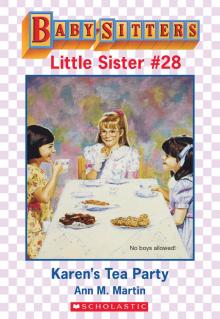 Karen's Tea Party
Karen's Tea Party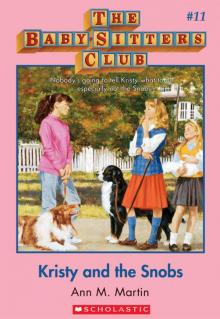 Kristy and the Snobs
Kristy and the Snobs Best Kept Secret
Best Kept Secret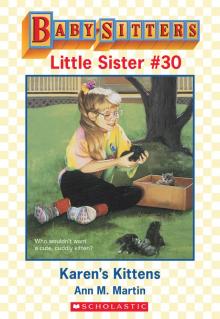 Karen's Kittens
Karen's Kittens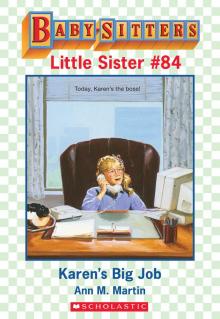 Karen's Big Job
Karen's Big Job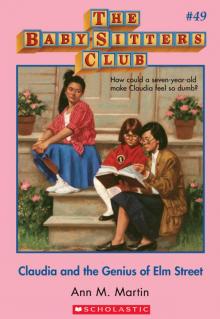 Claudia and the Genius of Elm Street
Claudia and the Genius of Elm Street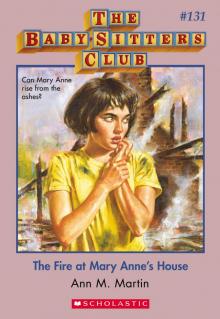 The Fire at Mary Anne's House
The Fire at Mary Anne's House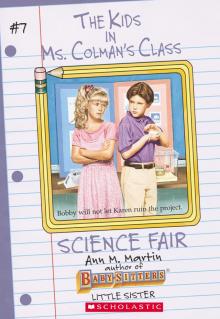 Science Fair
Science Fair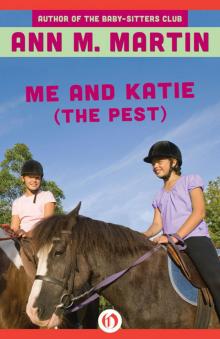 Me and Katie (The Pest)
Me and Katie (The Pest)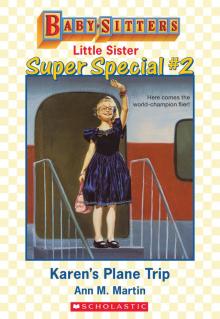 Karen's Plane Trip
Karen's Plane Trip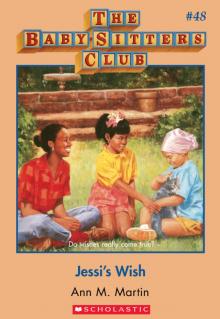 Jessi's Wish
Jessi's Wish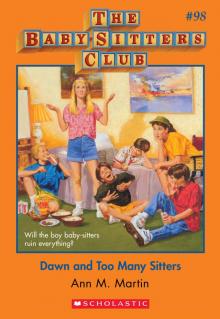 Dawn and Too Many Sitters
Dawn and Too Many Sitters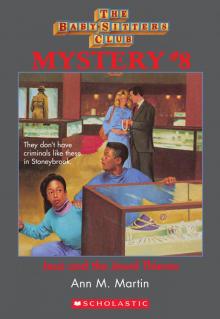 Jessi and the Jewel Thieves
Jessi and the Jewel Thieves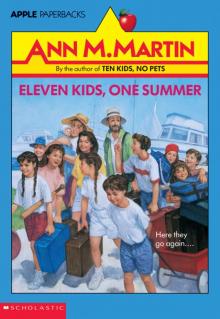 Eleven Kids, One Summer
Eleven Kids, One Summer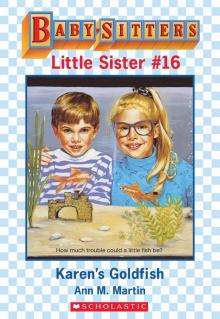 Karen's Goldfish
Karen's Goldfish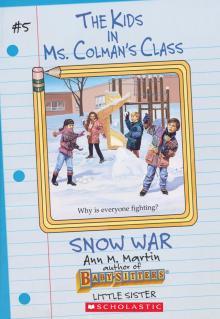 Snow War
Snow War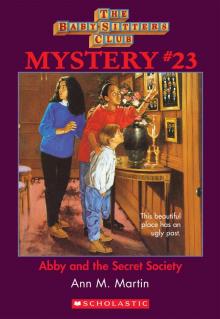 Abby and the Secret Society
Abby and the Secret Society Keeping Secrets
Keeping Secrets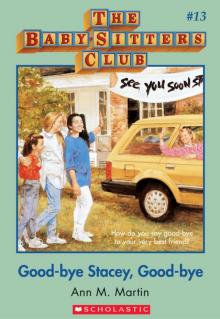 Good-Bye Stacey, Good-Bye
Good-Bye Stacey, Good-Bye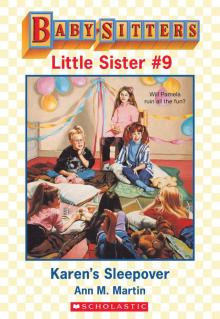 Karen's Sleepover
Karen's Sleepover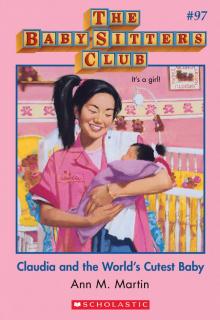 Claudia and the World's Cutest Baby
Claudia and the World's Cutest Baby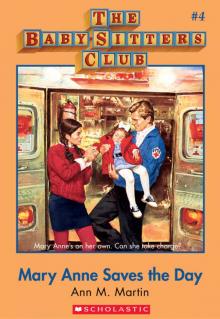 Mary Anne Saves the Day
Mary Anne Saves the Day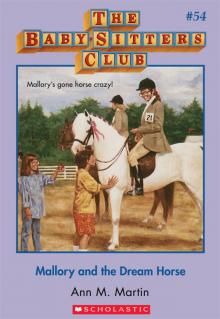 Mallory and the Dream Horse
Mallory and the Dream Horse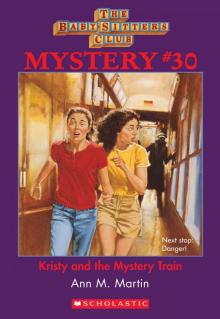 Kristy and the Mystery Train
Kristy and the Mystery Train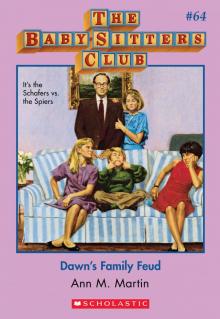 Dawn's Family Feud
Dawn's Family Feud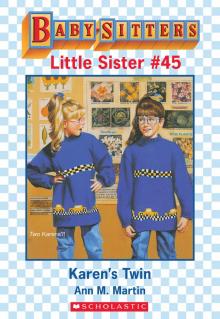 Karen's Twin
Karen's Twin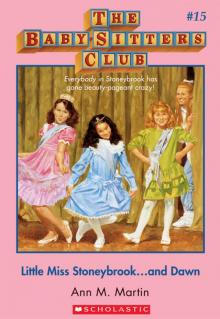 Little Miss Stoneybrook... And Dawn
Little Miss Stoneybrook... And Dawn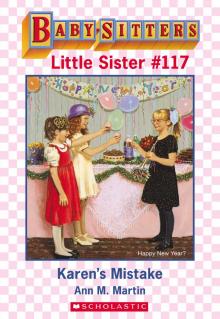 Karen's Mistake
Karen's Mistake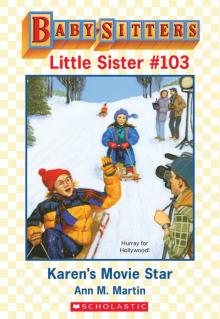 Karen's Movie Star
Karen's Movie Star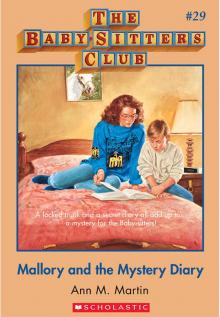 Mallory and the Mystery Diary
Mallory and the Mystery Diary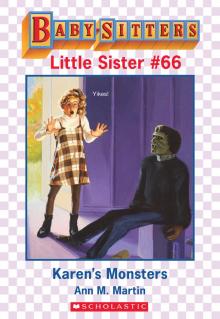 Karen's Monsters
Karen's Monsters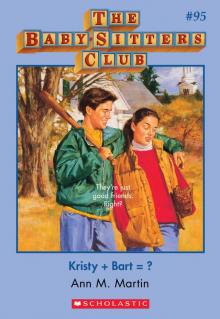 Kristy + Bart = ?
Kristy + Bart = ?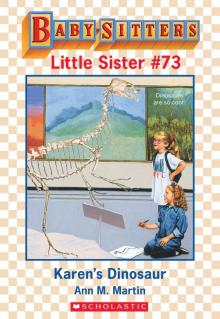 Karen's Dinosaur
Karen's Dinosaur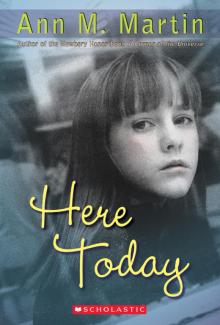 Here Today
Here Today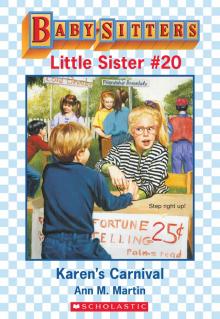 Karen's Carnival
Karen's Carnival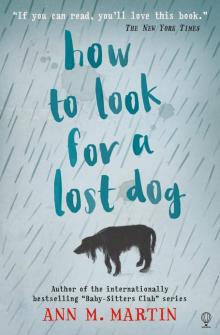 How to Look for a Lost Dog
How to Look for a Lost Dog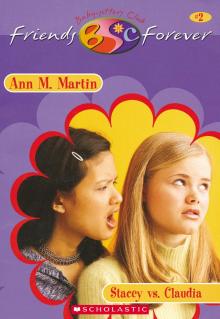 Stacey vs. Claudia
Stacey vs. Claudia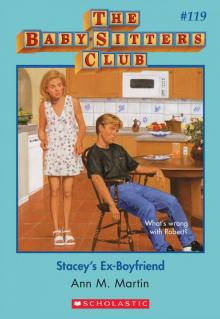 Stacey's Ex-Boyfriend
Stacey's Ex-Boyfriend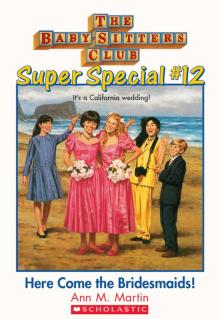 Here Come the Bridesmaids!
Here Come the Bridesmaids! Graduation Day
Graduation Day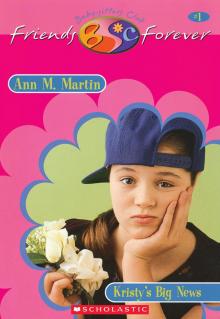 Kristy's Big News
Kristy's Big News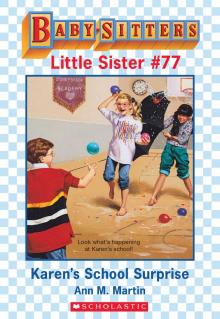 Karen's School Surprise
Karen's School Surprise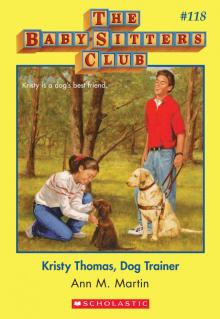 Kristy Thomas, Dog Trainer
Kristy Thomas, Dog Trainer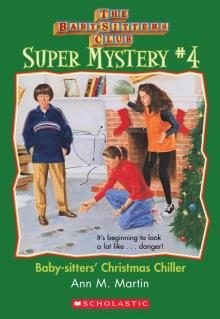 Baby-Sitters' Christmas Chiller
Baby-Sitters' Christmas Chiller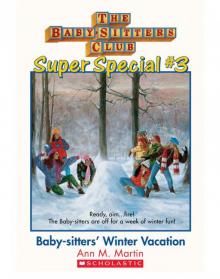 Baby-Sitters' Winter Vacation
Baby-Sitters' Winter Vacation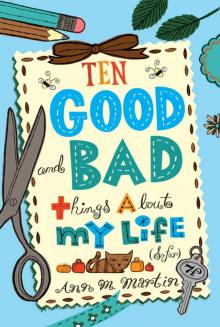 Ten Good and Bad Things About My Life
Ten Good and Bad Things About My Life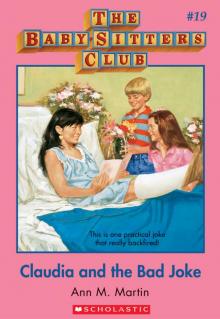 Claudia and the Bad Joke
Claudia and the Bad Joke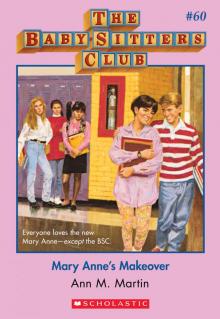 Mary Anne's Makeover
Mary Anne's Makeover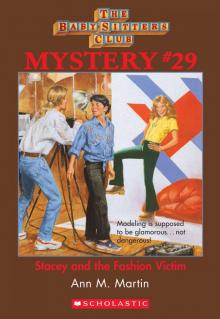 Stacey and the Fashion Victim
Stacey and the Fashion Victim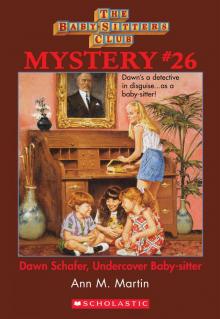 Dawn Schafer, Undercover Baby-Sitter
Dawn Schafer, Undercover Baby-Sitter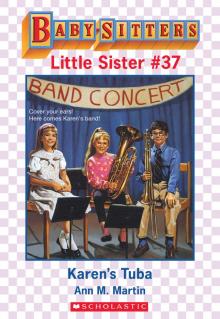 Karen's Tuba
Karen's Tuba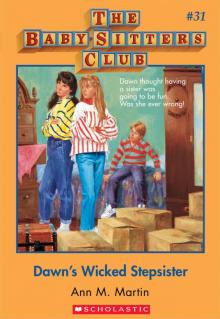 Dawn's Wicked Stepsister
Dawn's Wicked Stepsister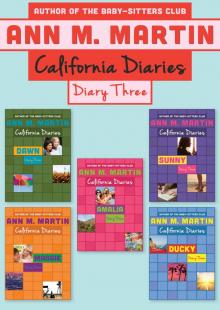 Diary Three: Dawn, Sunny, Maggie, Amalia, and Ducky
Diary Three: Dawn, Sunny, Maggie, Amalia, and Ducky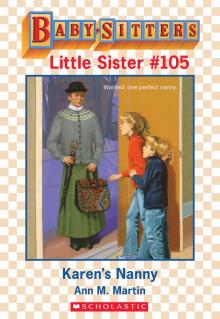 Karen's Nanny
Karen's Nanny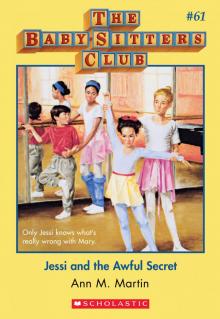 Jessi and the Awful Secret
Jessi and the Awful Secret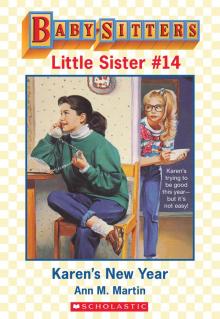 Karen's New Year
Karen's New Year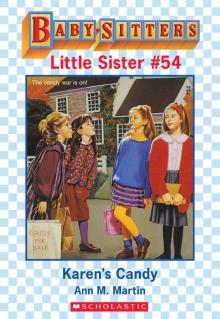 Karen's Candy
Karen's Candy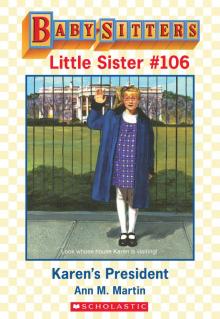 Karen's President
Karen's President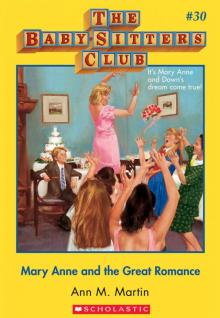 Mary Anne and the Great Romance
Mary Anne and the Great Romance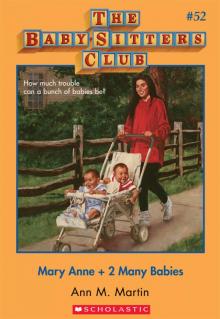 Mary Anne + 2 Many Babies
Mary Anne + 2 Many Babies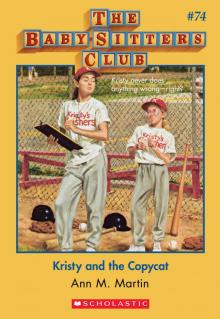 Kristy and the Copycat
Kristy and the Copycat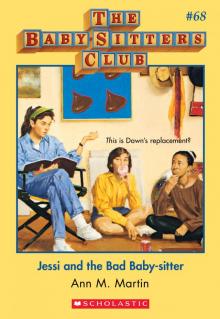 Jessi and the Bad Baby-Sitter
Jessi and the Bad Baby-Sitter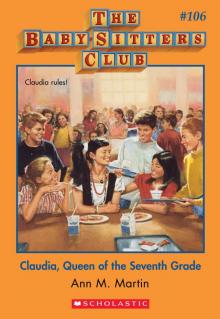 Claudia, Queen of the Seventh Grade
Claudia, Queen of the Seventh Grade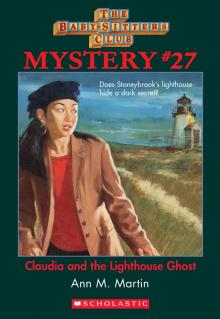 Claudia and the Lighthouse Ghost
Claudia and the Lighthouse Ghost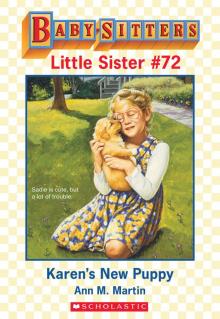 Karen's New Puppy
Karen's New Puppy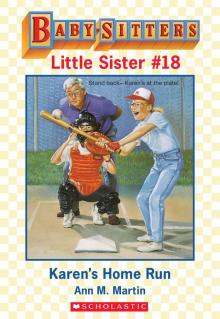 Karen's Home Run
Karen's Home Run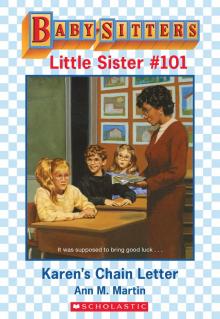 Karen's Chain Letter
Karen's Chain Letter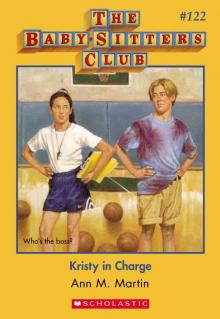 Kristy in Charge
Kristy in Charge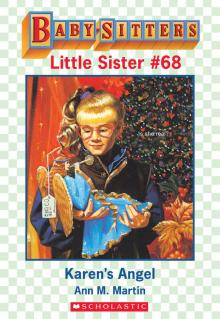 Karen's Angel
Karen's Angel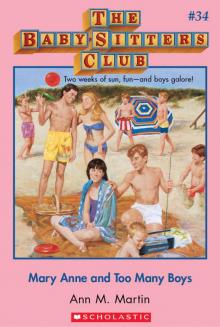 Mary Anne and Too Many Boys
Mary Anne and Too Many Boys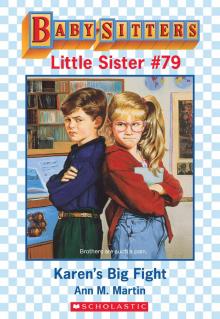 Karen's Big Fight
Karen's Big Fight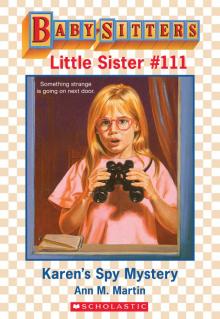 Karen's Spy Mystery
Karen's Spy Mystery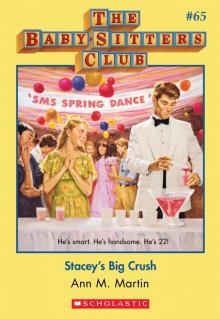 Stacey's Big Crush
Stacey's Big Crush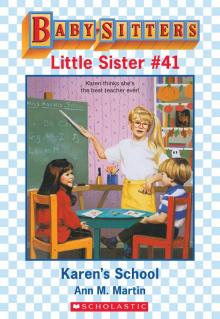 Karen's School
Karen's School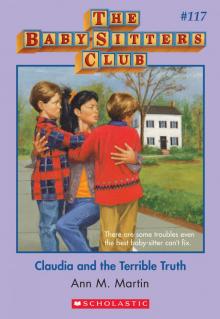 Claudia and the Terrible Truth
Claudia and the Terrible Truth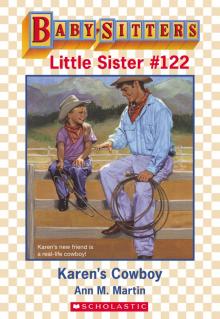 Karen's Cowboy
Karen's Cowboy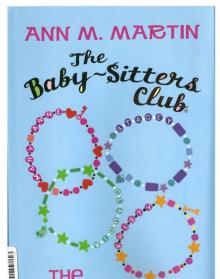 The Summer Before
The Summer Before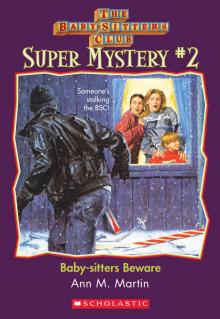 Beware, Dawn!
Beware, Dawn!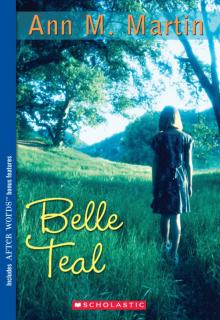 Belle Teale
Belle Teale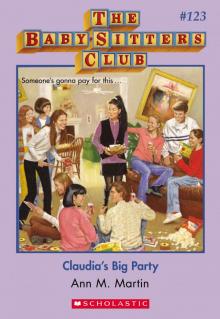 Claudia's Big Party
Claudia's Big Party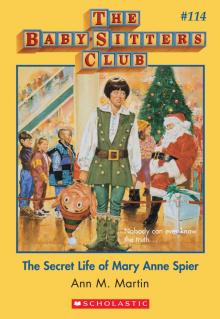 The Secret Life of Mary Anne Spier
The Secret Life of Mary Anne Spier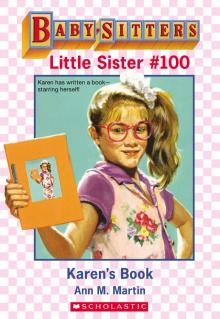 Karen's Book
Karen's Book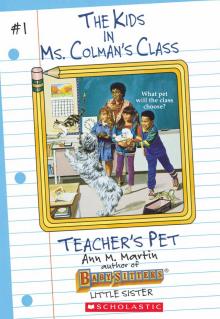 Teacher's Pet
Teacher's Pet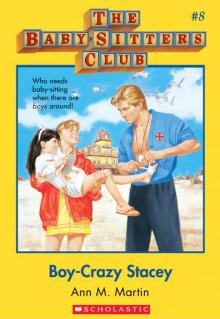 Boy-Crazy Stacey
Boy-Crazy Stacey Claudia and the Disaster Date
Claudia and the Disaster Date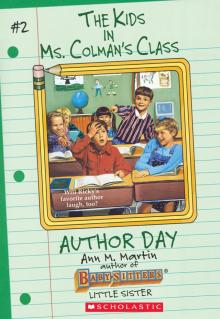 Author Day
Author Day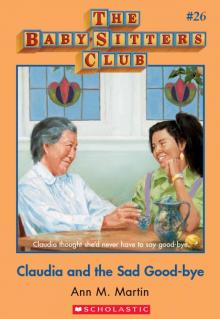 Claudia and the Sad Good-Bye
Claudia and the Sad Good-Bye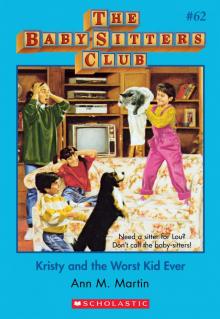 Kristy and the Worst Kid Ever
Kristy and the Worst Kid Ever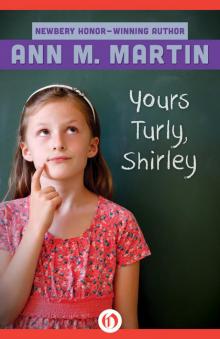 Yours Turly, Shirley
Yours Turly, Shirley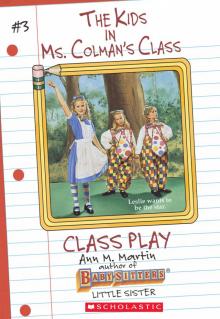 Class Play
Class Play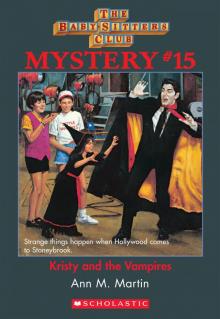 Kristy and the Vampires
Kristy and the Vampires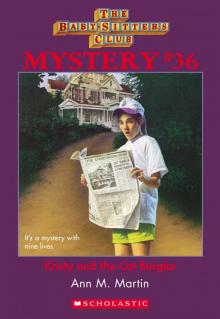 Kristy and the Cat Burglar
Kristy and the Cat Burglar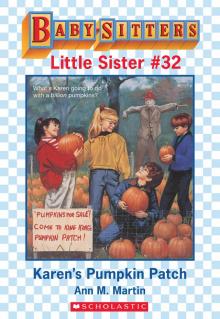 Karen's Pumpkin Patch
Karen's Pumpkin Patch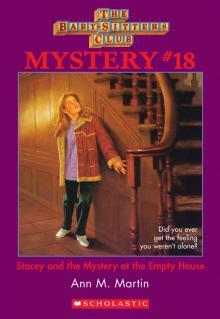 Stacey and the Mystery at the Empty House
Stacey and the Mystery at the Empty House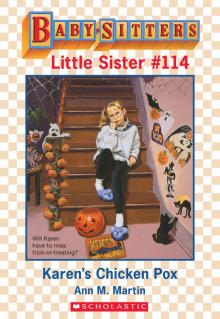 Karen's Chicken Pox
Karen's Chicken Pox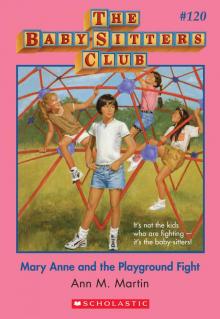 Mary Anne and the Playground Fight
Mary Anne and the Playground Fight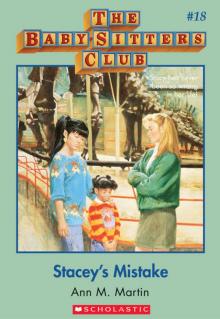 Stacey's Mistake
Stacey's Mistake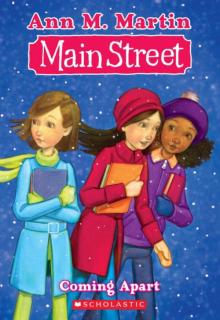 Coming Apart
Coming Apart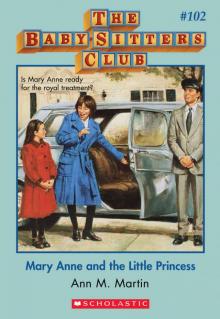 Mary Anne and the Little Princess
Mary Anne and the Little Princess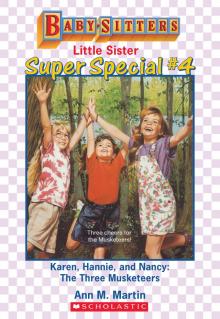 Karen, Hannie and Nancy: The Three Musketeers
Karen, Hannie and Nancy: The Three Musketeers 'Tis the Season
'Tis the Season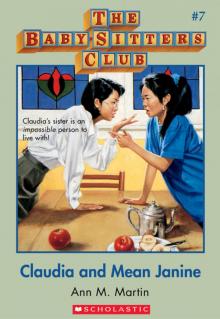 Claudia and Mean Janine
Claudia and Mean Janine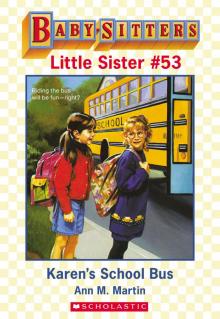 Karen's School Bus
Karen's School Bus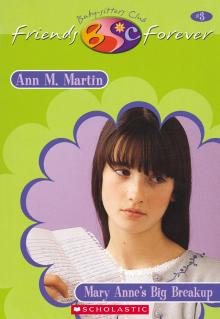 Mary Anne's Big Breakup
Mary Anne's Big Breakup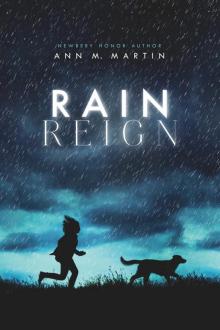 Rain Reign
Rain Reign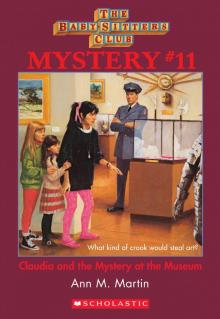 Claudia and the Mystery at the Museum
Claudia and the Mystery at the Museum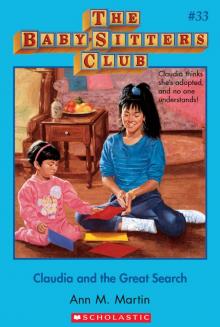 Claudia and the Great Search
Claudia and the Great Search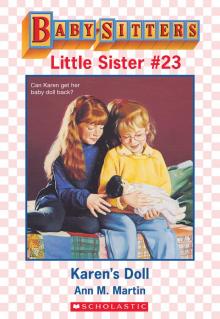 Karen's Doll
Karen's Doll Shannon's Story
Shannon's Story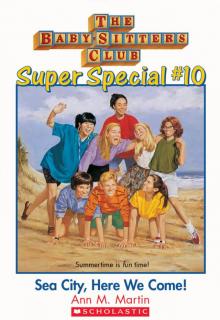 Sea City, Here We Come!
Sea City, Here We Come!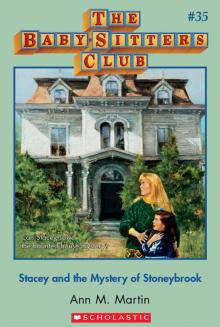 Stacey and the Mystery of Stoneybrook
Stacey and the Mystery of Stoneybrook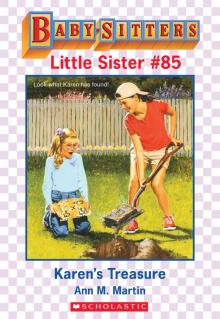 Karen's Treasure
Karen's Treasure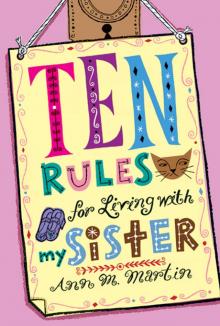 Ten Rules for Living With My Sister
Ten Rules for Living With My Sister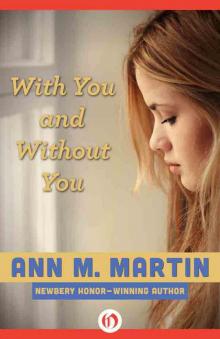 With You and Without You
With You and Without You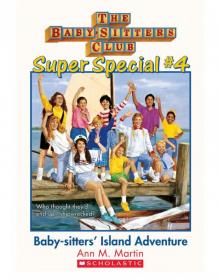 Baby-Sitters' Island Adventure
Baby-Sitters' Island Adventure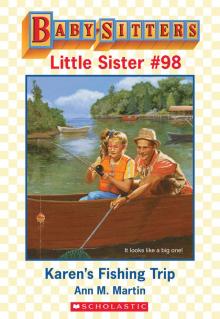 Karen's Fishing Trip
Karen's Fishing Trip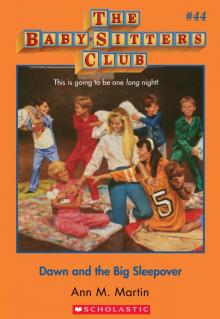 Dawn and the Big Sleepover
Dawn and the Big Sleepover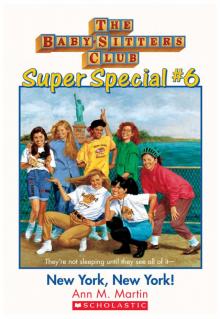 New York, New York!
New York, New York!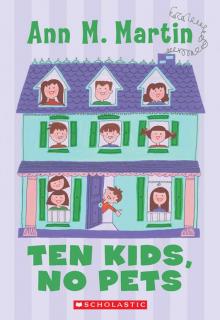 Ten Kids, No Pets
Ten Kids, No Pets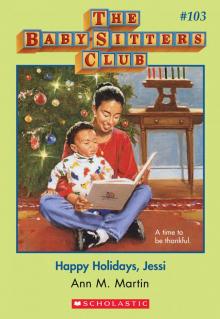 Happy Holidays, Jessi
Happy Holidays, Jessi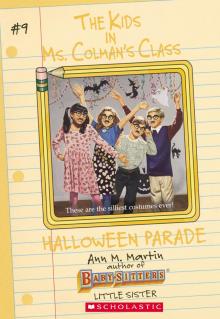 Halloween Parade
Halloween Parade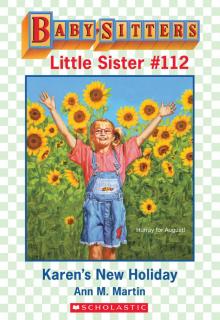 Karen's New Holiday
Karen's New Holiday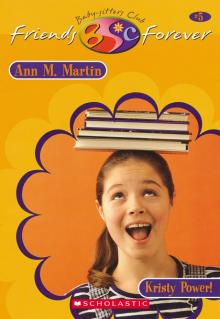 Kristy Power!
Kristy Power!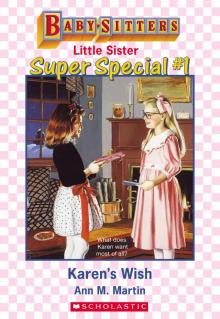 Karen's Wish
Karen's Wish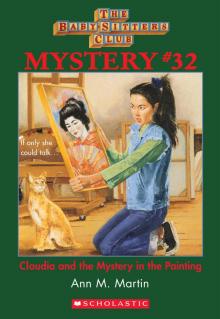 Claudia and the Mystery in the Painting
Claudia and the Mystery in the Painting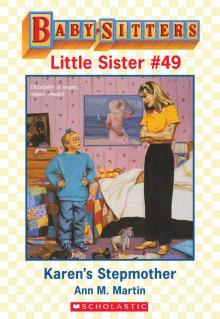 Karen's Stepmother
Karen's Stepmother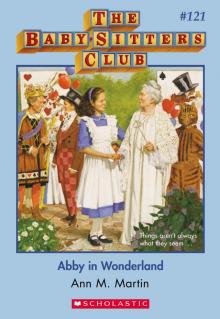 Abby in Wonderland
Abby in Wonderland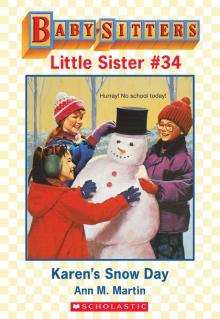 Karen's Snow Day
Karen's Snow Day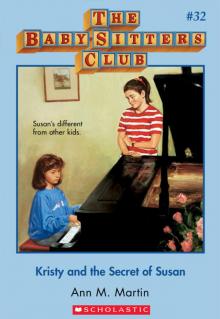 Kristy and the Secret of Susan
Kristy and the Secret of Susan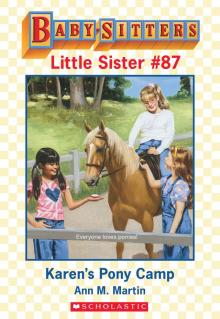 Karen's Pony Camp
Karen's Pony Camp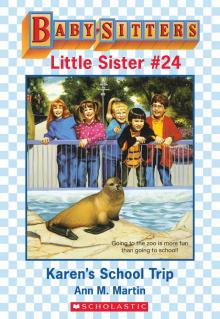 Karen's School Trip
Karen's School Trip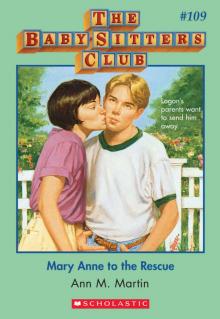 Mary Anne to the Rescue
Mary Anne to the Rescue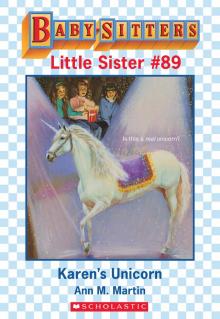 Karen's Unicorn
Karen's Unicorn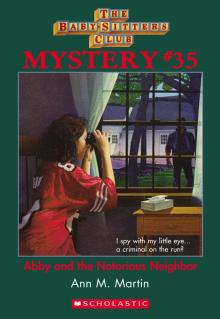 Abby and the Notorious Neighbor
Abby and the Notorious Neighbor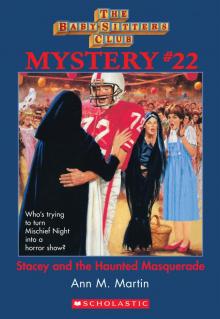 Stacey and the Haunted Masquerade
Stacey and the Haunted Masquerade Claudia Gets Her Guy
Claudia Gets Her Guy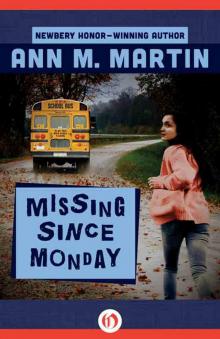 Missing Since Monday
Missing Since Monday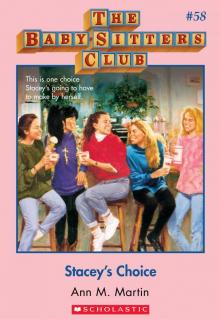 Stacey's Choice
Stacey's Choice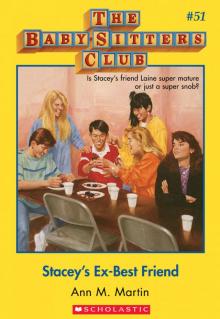 Stacey's Ex-Best Friend
Stacey's Ex-Best Friend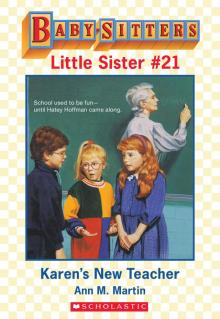 Karen's New Teacher
Karen's New Teacher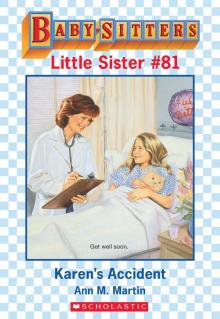 Karen's Accident
Karen's Accident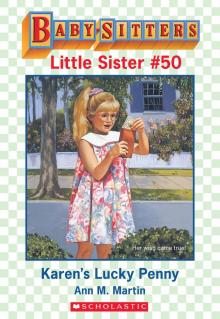 Karen's Lucky Penny
Karen's Lucky Penny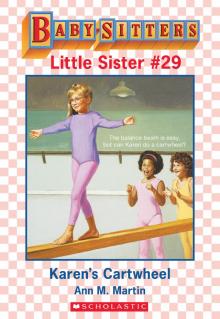 Karen's Cartwheel
Karen's Cartwheel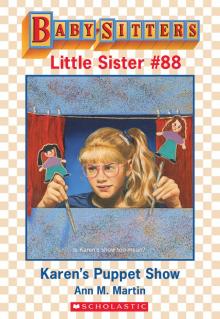 Karen's Puppet Show
Karen's Puppet Show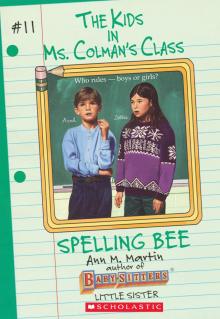 Spelling Bee
Spelling Bee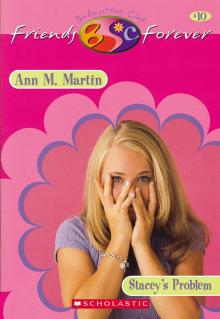 Stacey's Problem
Stacey's Problem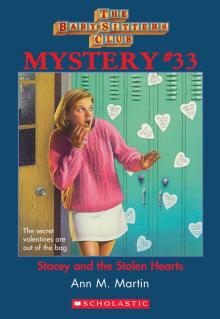 Stacey and the Stolen Hearts
Stacey and the Stolen Hearts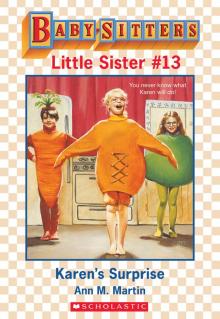 Karen's Surprise
Karen's Surprise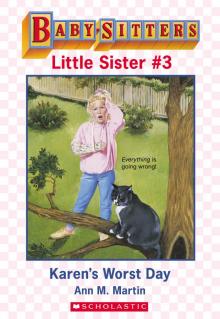 Karen's Worst Day
Karen's Worst Day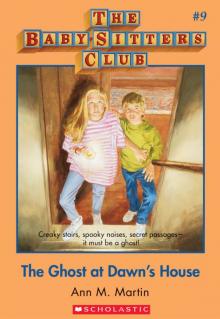 The Ghost at Dawn's House
The Ghost at Dawn's House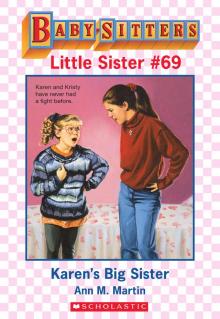 Karen's Big Sister
Karen's Big Sister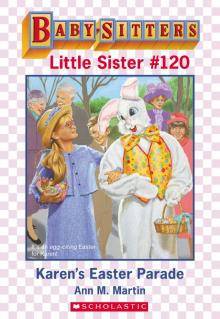 Karen's Easter Parade
Karen's Easter Parade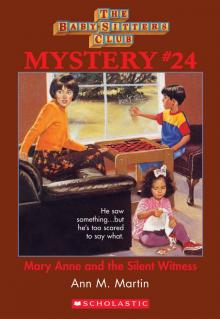 Mary Anne and the Silent Witness
Mary Anne and the Silent Witness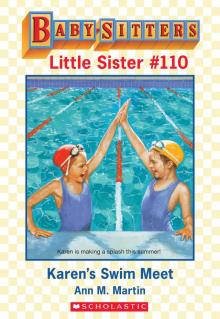 Karen's Swim Meet
Karen's Swim Meet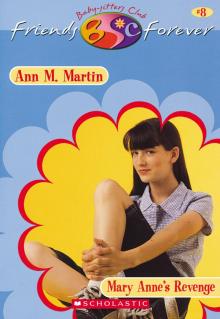 Mary Anne's Revenge
Mary Anne's Revenge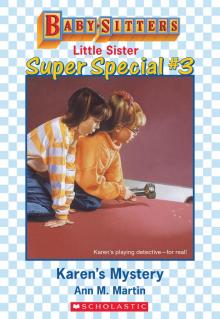 Karen's Mystery
Karen's Mystery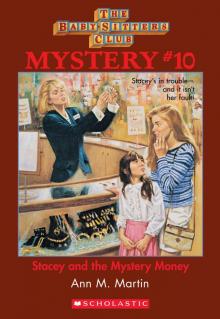 Stacey and the Mystery Money
Stacey and the Mystery Money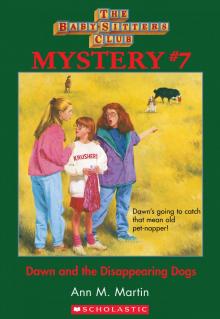 Dawn and the Disappearing Dogs
Dawn and the Disappearing Dogs Karen's Christmas Tree
Karen's Christmas Tree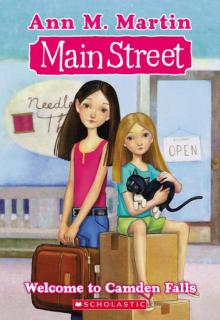 Welcome to Camden Falls
Welcome to Camden Falls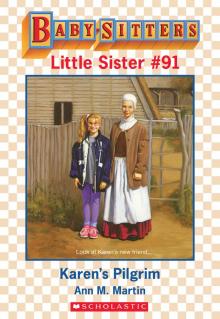 Karen's Pilgrim
Karen's Pilgrim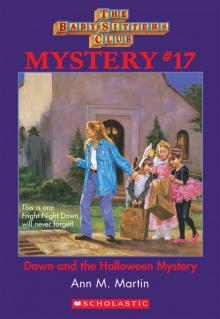 Dawn and the Halloween Mystery
Dawn and the Halloween Mystery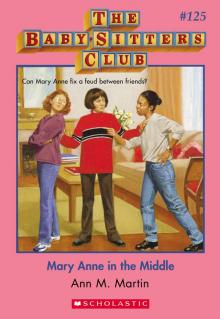 Mary Anne in the Middle
Mary Anne in the Middle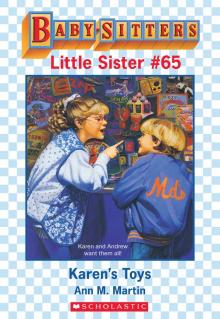 Karen's Toys
Karen's Toys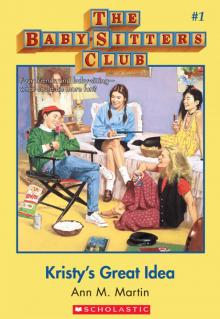 Kristy's Great Idea
Kristy's Great Idea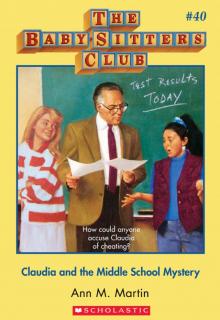 Claudia and the Middle School Mystery
Claudia and the Middle School Mystery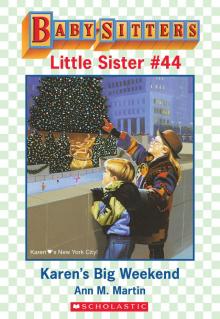 Karen's Big Weekend
Karen's Big Weekend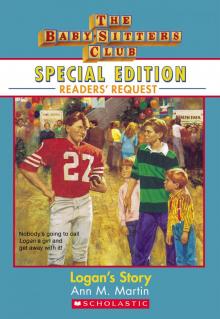 Logan's Story
Logan's Story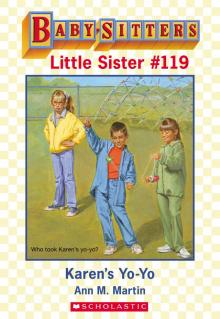 Karen's Yo-Yo
Karen's Yo-Yo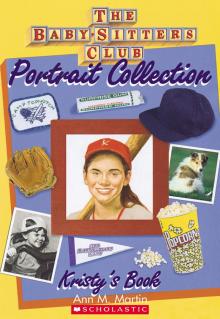 Kristy's Book
Kristy's Book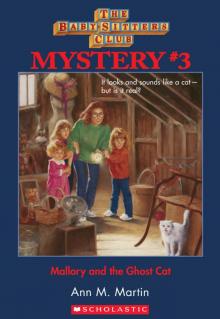 Mallory and the Ghost Cat
Mallory and the Ghost Cat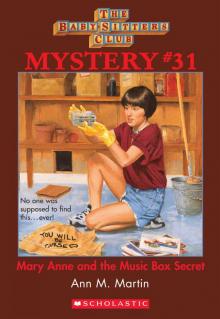 Mary Anne and the Music
Mary Anne and the Music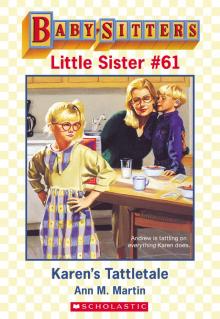 Karen's Tattletale
Karen's Tattletale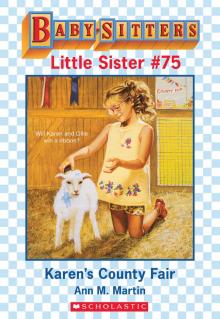 Karen's County Fair
Karen's County Fair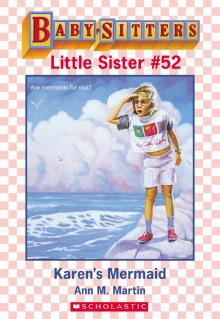 Karen's Mermaid
Karen's Mermaid Snowbound
Snowbound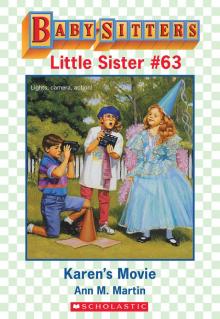 Karen's Movie
Karen's Movie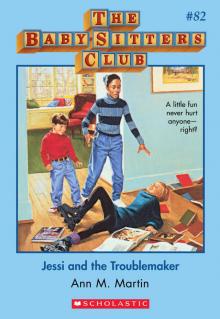 Jessi and the Troublemaker
Jessi and the Troublemaker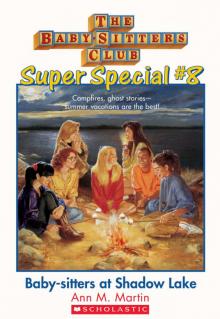 Baby-Sitters at Shadow Lake
Baby-Sitters at Shadow Lake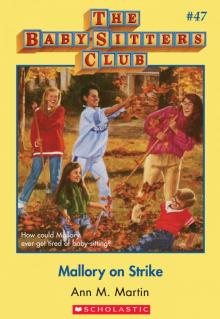 Mallory on Strike
Mallory on Strike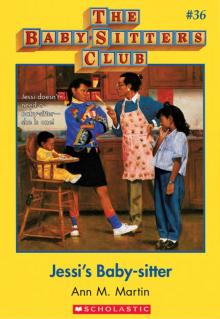 Jessi's Baby-Sitter
Jessi's Baby-Sitter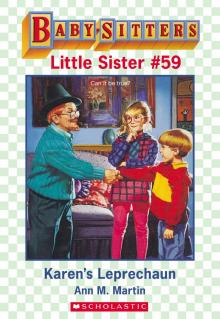 Karen's Leprechaun
Karen's Leprechaun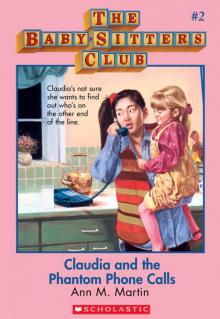 Claudia and the Phantom Phone Calls
Claudia and the Phantom Phone Calls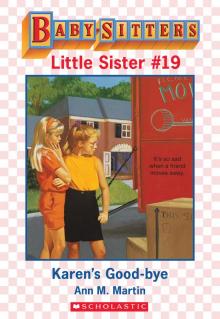 Karen's Good-Bye
Karen's Good-Bye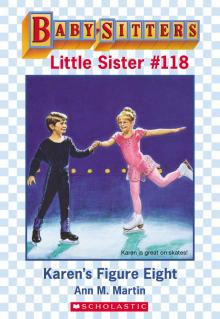 Karen's Figure Eight
Karen's Figure Eight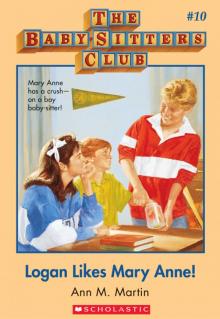 Logan Likes Mary Anne!
Logan Likes Mary Anne!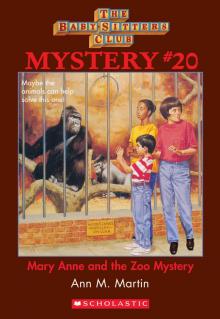 Mary Anne and the Zoo Mystery
Mary Anne and the Zoo Mystery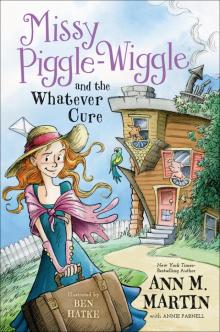 Missy Piggle-Wiggle and the Whatever Cure
Missy Piggle-Wiggle and the Whatever Cure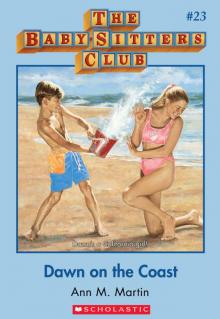 Dawn on the Coast
Dawn on the Coast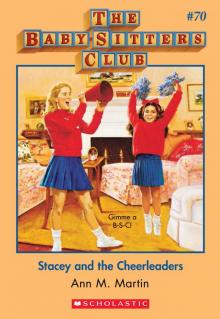 Stacey and the Cheerleaders
Stacey and the Cheerleaders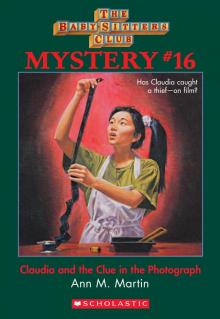 Claudia and the Clue in the Photograph
Claudia and the Clue in the Photograph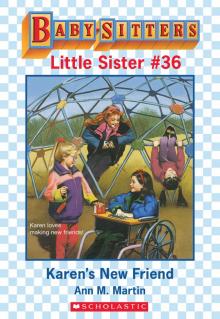 Karen's New Friend
Karen's New Friend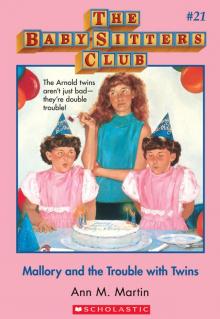 Mallory and the Trouble With Twins
Mallory and the Trouble With Twins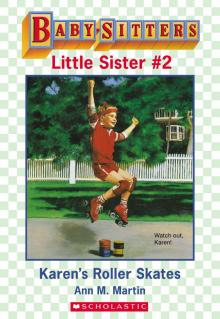 Karen's Roller Skates
Karen's Roller Skates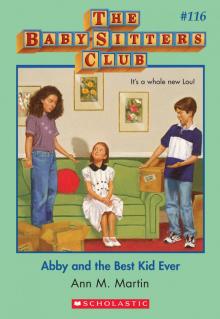 Abby and the Best Kid Ever
Abby and the Best Kid Ever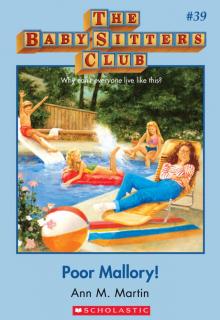 Poor Mallory!
Poor Mallory!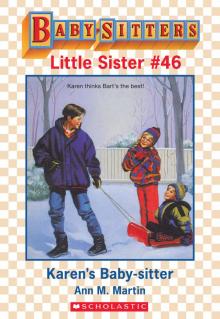 Karen's Witch
Karen's Witch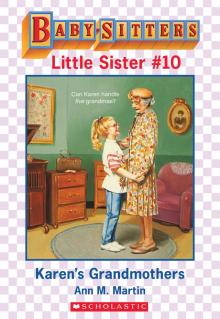 Karen's Grandmothers
Karen's Grandmothers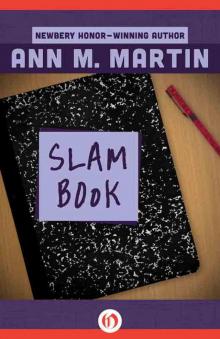 Slam Book
Slam Book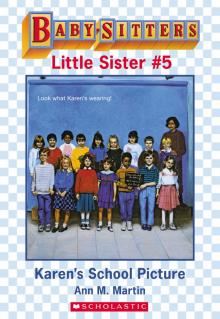 Karen's School Picture
Karen's School Picture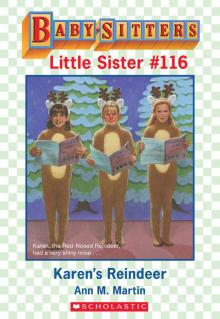 Karen's Reindeer
Karen's Reindeer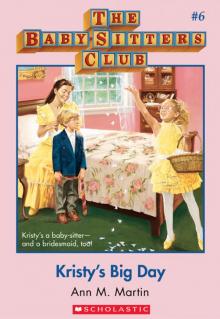 Kristy's Big Day
Kristy's Big Day The Long Way Home
The Long Way Home Karen's Sleigh Ride
Karen's Sleigh Ride On Christmas Eve
On Christmas Eve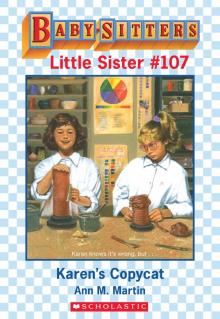 Karen's Copycat
Karen's Copycat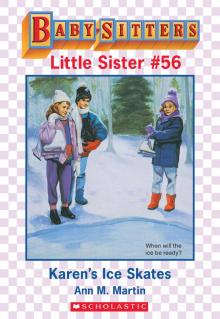 Karen's Ice Skates
Karen's Ice Skates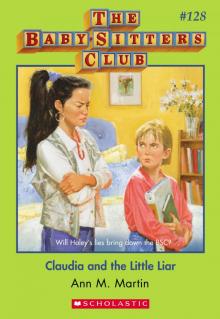 Claudia and the Little Liar
Claudia and the Little Liar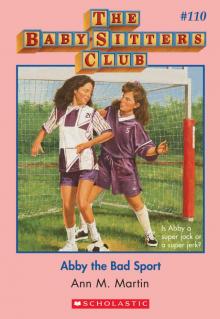 Abby the Bad Sport
Abby the Bad Sport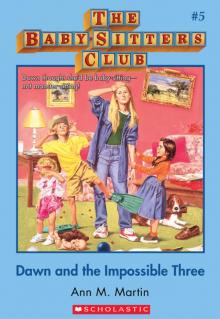 The Baby-Sitters Club #5: Dawn and the Impossible Three
The Baby-Sitters Club #5: Dawn and the Impossible Three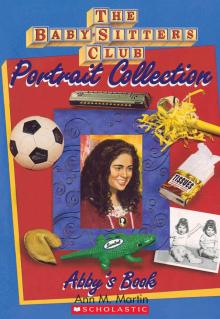 Abby's Book
Abby's Book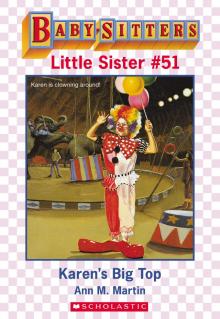 Karen's Big Top
Karen's Big Top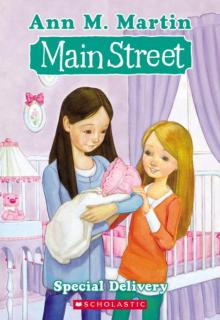 Main Street #8: Special Delivery
Main Street #8: Special Delivery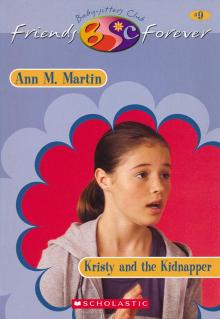 Kristy and the Kidnapper
Kristy and the Kidnapper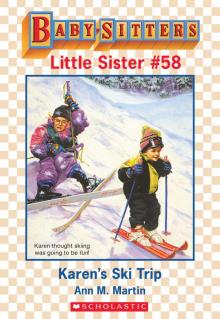 Karen's Ski Trip
Karen's Ski Trip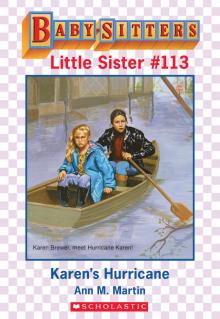 Karen's Hurricane
Karen's Hurricane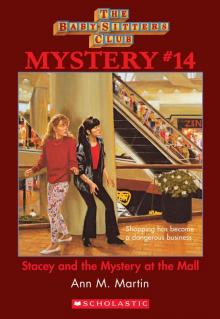 Stacey and the Mystery at the Mall
Stacey and the Mystery at the Mall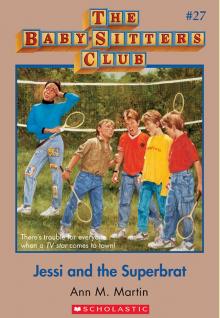 Jessi and the Superbrat
Jessi and the Superbrat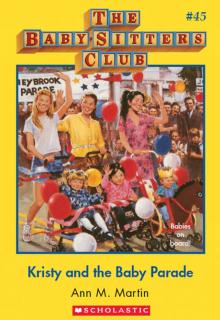 Kristy and the Baby Parade
Kristy and the Baby Parade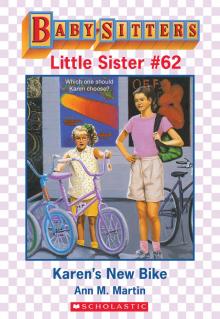 Karen's New Bike
Karen's New Bike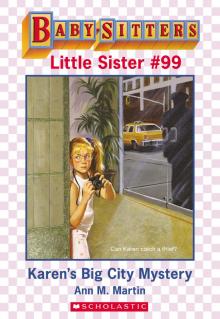 Karen's Big City Mystery
Karen's Big City Mystery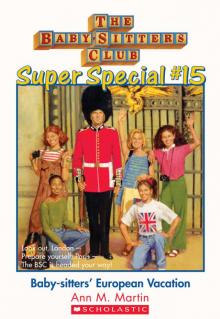 Baby-Sitters' European Vacation
Baby-Sitters' European Vacation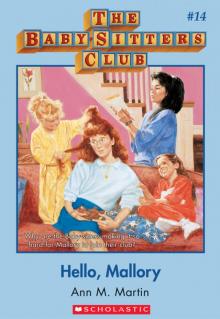 Hello, Mallory
Hello, Mallory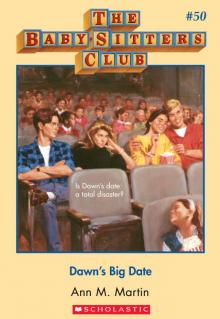 Dawn's Big Date
Dawn's Big Date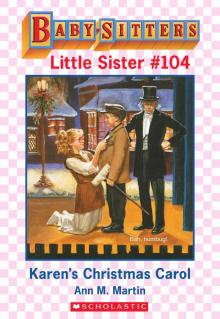 Karen's Christmas Carol
Karen's Christmas Carol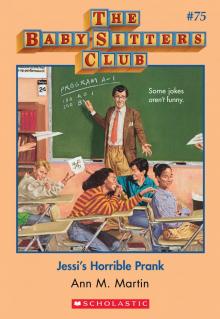 Jessi's Horrible Prank
Jessi's Horrible Prank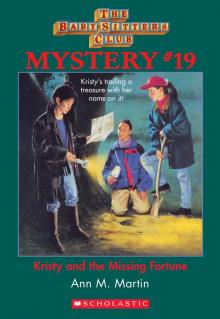 Kristy and the Missing Fortune
Kristy and the Missing Fortune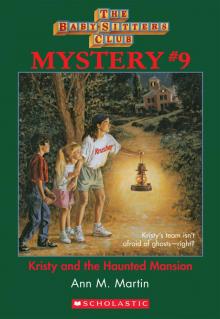 Kristy and the Haunted Mansion
Kristy and the Haunted Mansion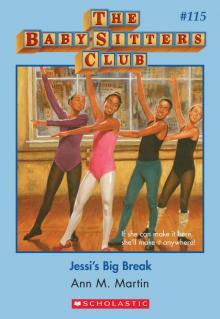 Jessi's Big Break
Jessi's Big Break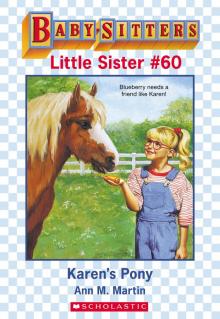 Karen's Pony
Karen's Pony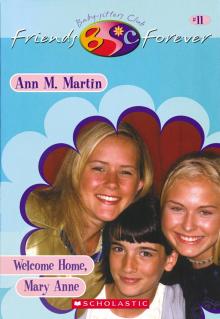 Welcome Home, Mary Anne
Welcome Home, Mary Anne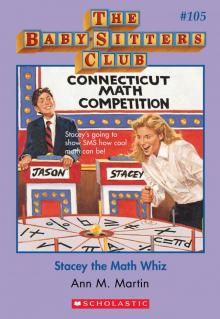 Stacey the Math Whiz
Stacey the Math Whiz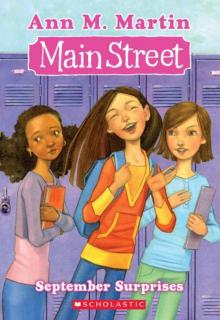 September Surprises
September Surprises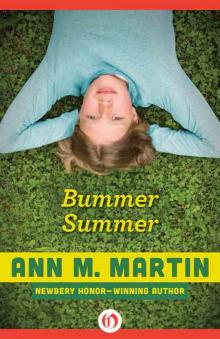 Bummer Summer
Bummer Summer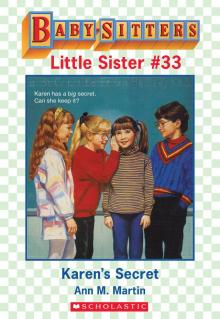 Karen's Secret
Karen's Secret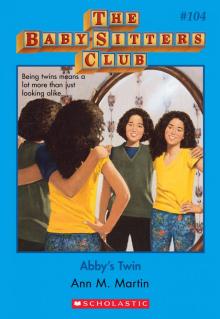 Abby's Twin
Abby's Twin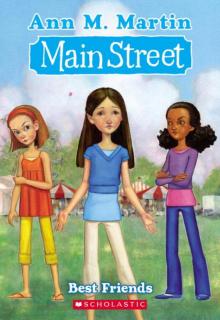 Main Street #4: Best Friends
Main Street #4: Best Friends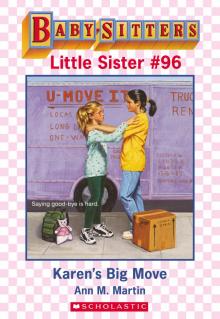 Karen's Big Move
Karen's Big Move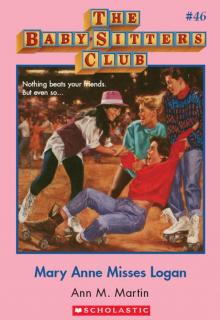 Mary Anne Misses Logan
Mary Anne Misses Logan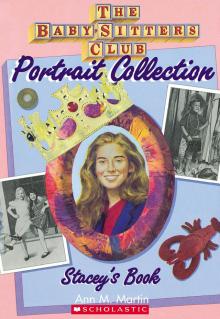 Stacey's Book
Stacey's Book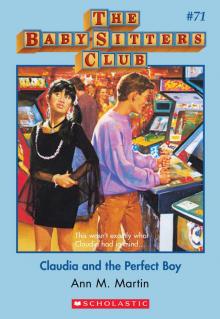 Claudia and the Perfect Boy
Claudia and the Perfect Boy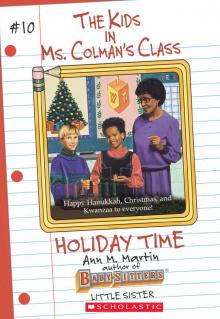 Holiday Time
Holiday Time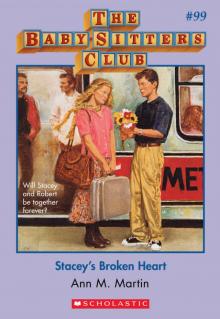 Stacey's Broken Heart
Stacey's Broken Heart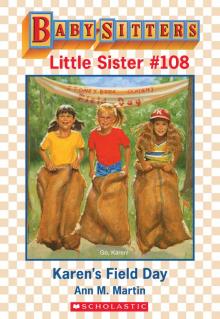 Karen's Field Day
Karen's Field Day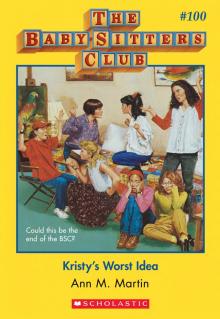 Kristy's Worst Idea
Kristy's Worst Idea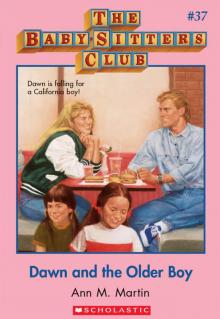 Dawn and the Older Boy
Dawn and the Older Boy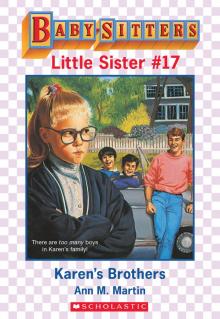 Karen's Brothers
Karen's Brothers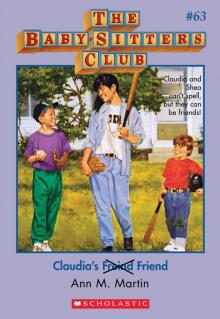 Claudia's Friend
Claudia's Friend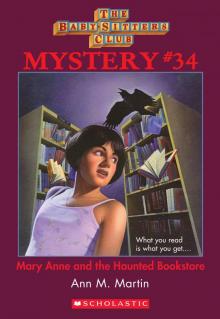 Mary Anne and the Haunted Bookstore
Mary Anne and the Haunted Bookstore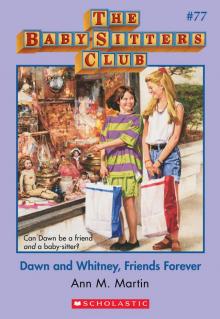 Dawn and Whitney, Friends Forever
Dawn and Whitney, Friends Forever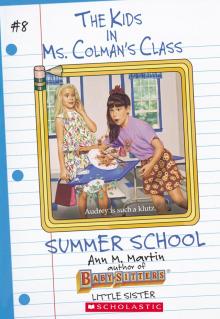 Summer School
Summer School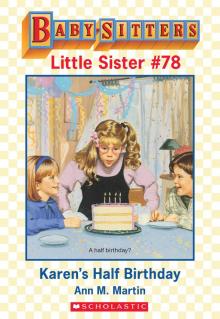 Karen's Birthday
Karen's Birthday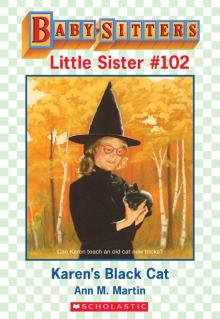 Karen's Black Cat
Karen's Black Cat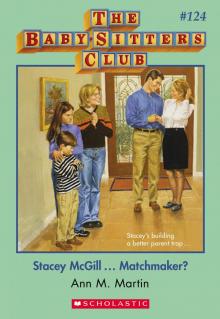 Stacey McGill... Matchmaker?
Stacey McGill... Matchmaker?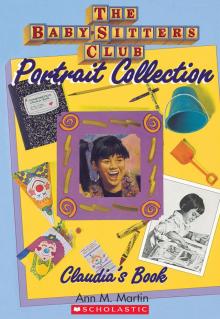 Claudia's Book
Claudia's Book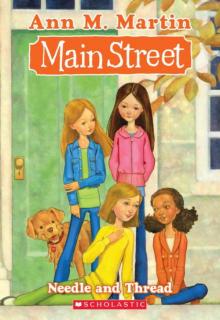 Main Street #2: Needle and Thread
Main Street #2: Needle and Thread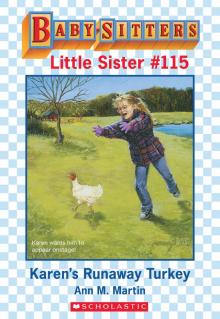 Karen's Runaway Turkey
Karen's Runaway Turkey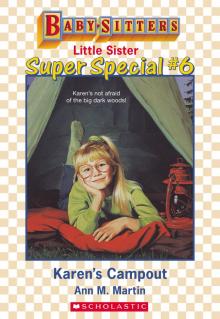 Karen's Campout
Karen's Campout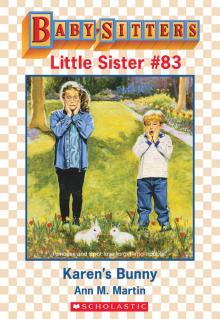 Karen's Bunny
Karen's Bunny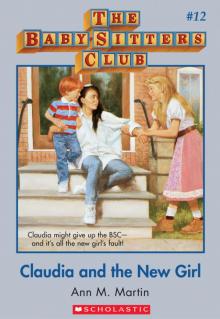 Claudia and the New Girl
Claudia and the New Girl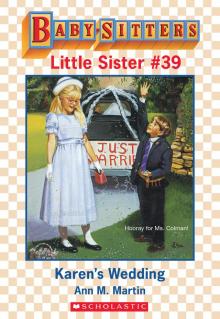 Karen's Wedding
Karen's Wedding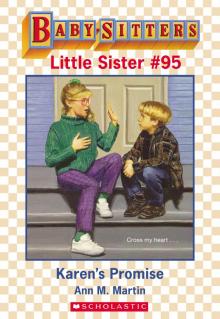 Karen's Promise
Karen's Promise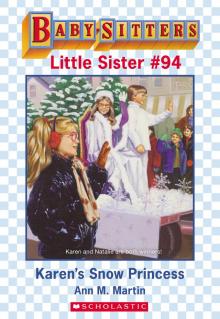 Karen's Snow Princess
Karen's Snow Princess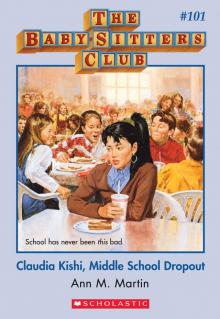 Claudia Kishi, Middle School Dropout
Claudia Kishi, Middle School Dropout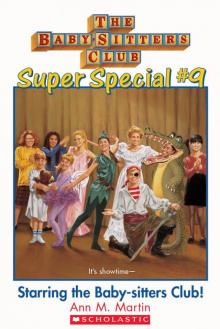 Starring the Baby-Sitters Club!
Starring the Baby-Sitters Club!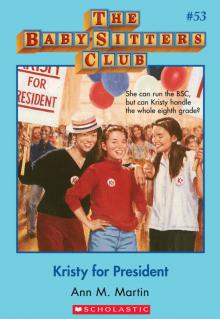 Kristy for President
Kristy for President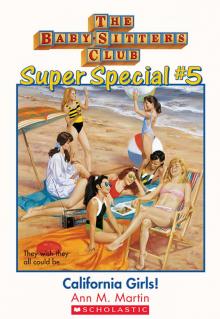 California Girls!
California Girls!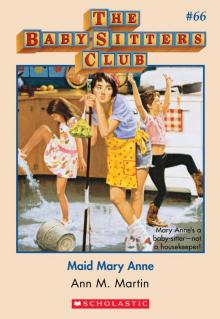 Maid Mary Anne
Maid Mary Anne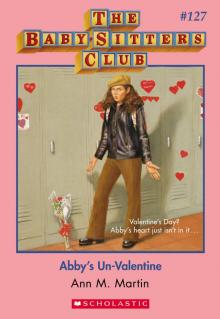 Abby's Un-Valentine
Abby's Un-Valentine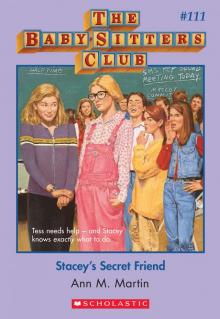 Stacey's Secret Friend
Stacey's Secret Friend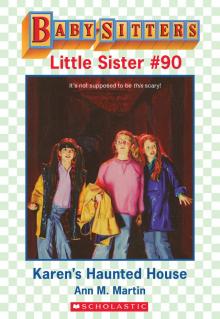 Karen's Haunted House
Karen's Haunted House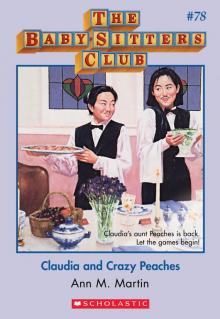 Claudia and Crazy Peaches
Claudia and Crazy Peaches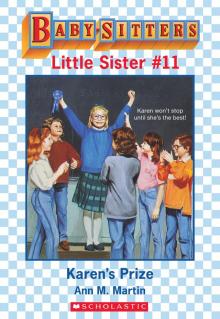 Karen's Prize
Karen's Prize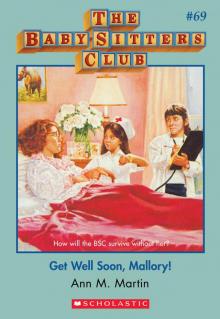 Get Well Soon, Mallory!
Get Well Soon, Mallory!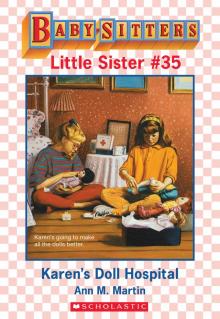 Karen's Doll Hospital
Karen's Doll Hospital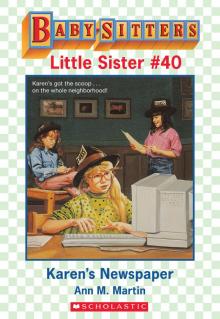 Karen's Newspaper
Karen's Newspaper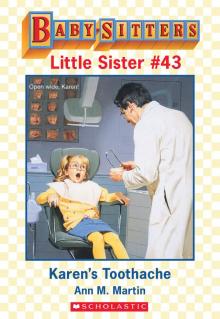 Karen's Toothache
Karen's Toothache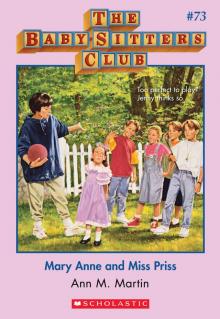 Mary Anne and Miss Priss
Mary Anne and Miss Priss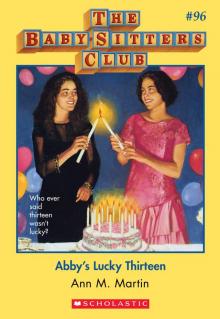 Abby's Lucky Thirteen
Abby's Lucky Thirteen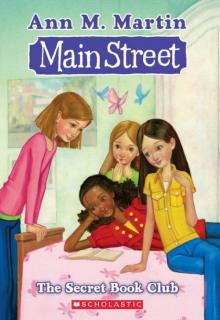 The Secret Book Club
The Secret Book Club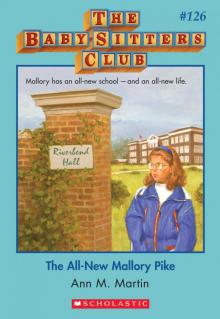 The All-New Mallory Pike
The All-New Mallory Pike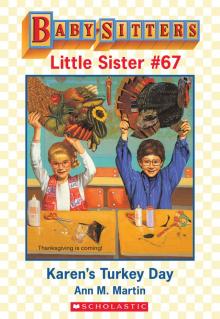 Karen's Turkey Day
Karen's Turkey Day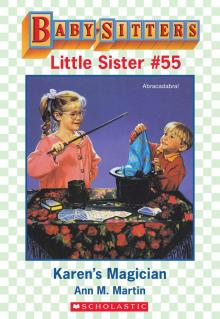 Karen's Magician
Karen's Magician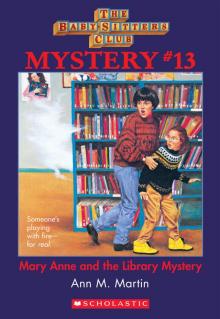 Mary Anne and the Library Mystery
Mary Anne and the Library Mystery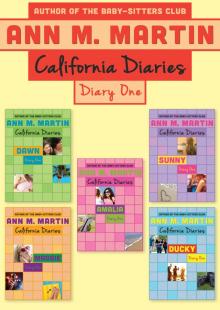 Diary One: Dawn, Sunny, Maggie, Amalia, and Ducky
Diary One: Dawn, Sunny, Maggie, Amalia, and Ducky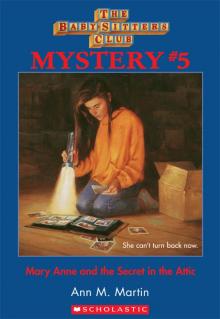 Mary Anne and the Secret in the Attic
Mary Anne and the Secret in the Attic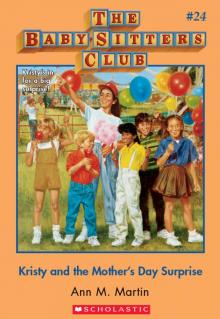 Kristy and the Mother's Day Surprise
Kristy and the Mother's Day Surprise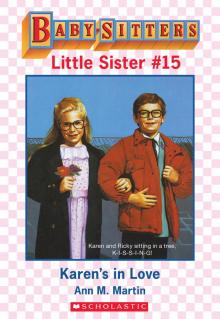 Karen's in Love
Karen's in Love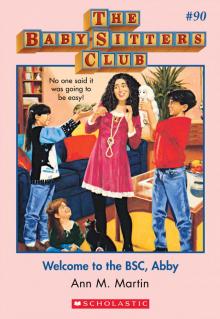 Welcome to the BSC, Abby
Welcome to the BSC, Abby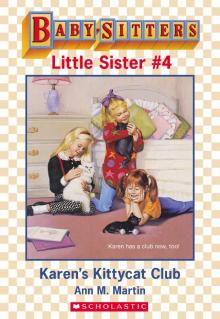 Karen's Kittycat Club
Karen's Kittycat Club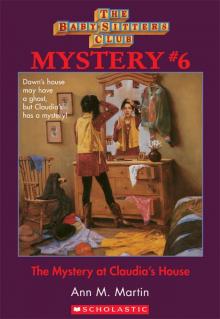 The Mystery at Claudia's House
The Mystery at Claudia's House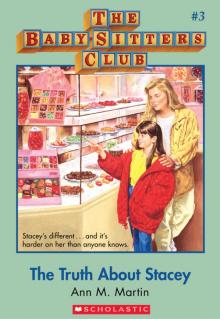 The Truth About Stacey
The Truth About Stacey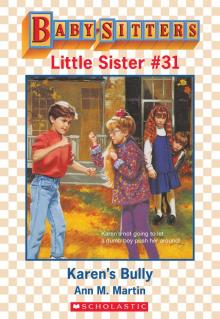 Karen's Bully
Karen's Bully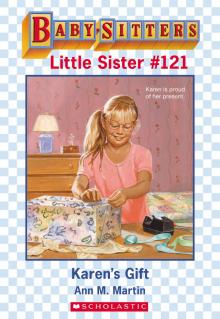 Karen's Gift
Karen's Gift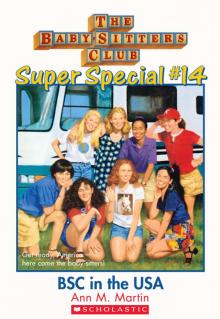 BSC in the USA
BSC in the USA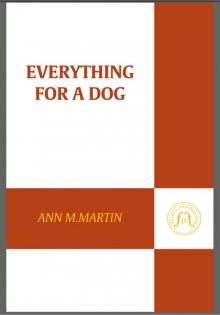 Everything for a Dog
Everything for a Dog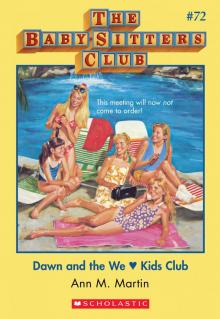 Dawn and the We Love Kids Club
Dawn and the We Love Kids Club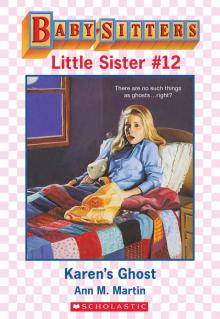 Karen's Ghost
Karen's Ghost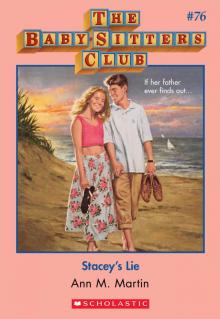 Stacey's Lie
Stacey's Lie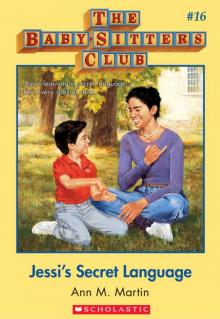 Jessi's Secret Language
Jessi's Secret Language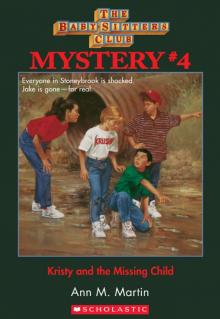 Kristy and the Missing Child
Kristy and the Missing Child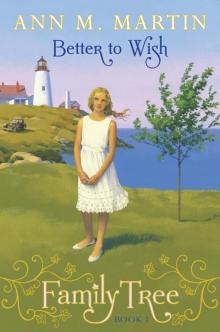 Better to Wish
Better to Wish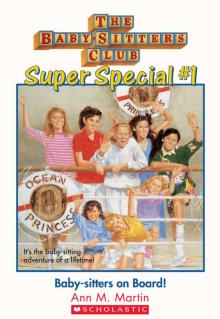 Baby-Sitters on Board!
Baby-Sitters on Board!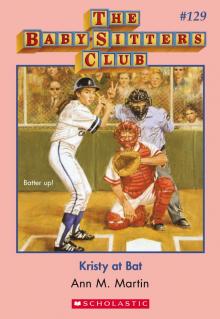 Kristy at Bat
Kristy at Bat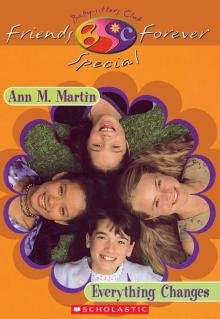 Everything Changes
Everything Changes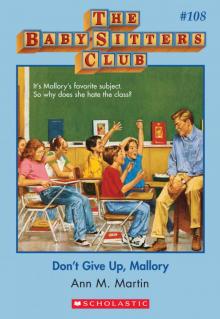 Don't Give Up, Mallory
Don't Give Up, Mallory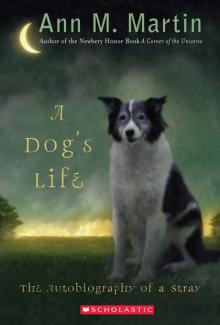 A Dog's Life: The Autobiography of a Stray
A Dog's Life: The Autobiography of a Stray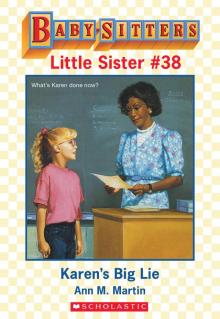 Karen's Big Lie
Karen's Big Lie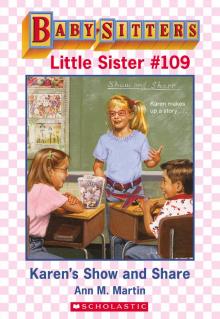 Karen's Show and Share
Karen's Show and Share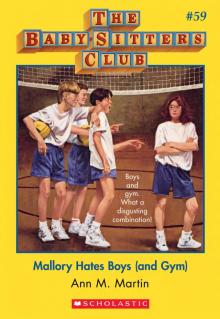 Mallory Hates Boys (and Gym)
Mallory Hates Boys (and Gym)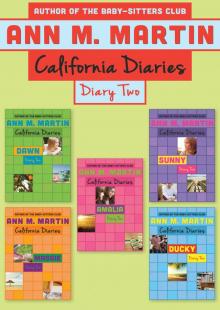 Diary Two: Dawn, Sunny, Maggie, Amalia, and Ducky
Diary Two: Dawn, Sunny, Maggie, Amalia, and Ducky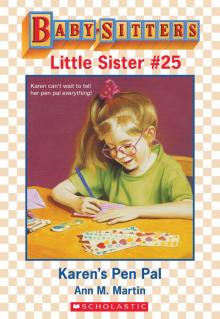 Karen's Pen Pal
Karen's Pen Pal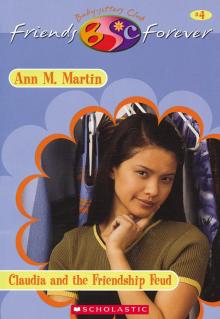 Claudia and the Friendship Feud
Claudia and the Friendship Feud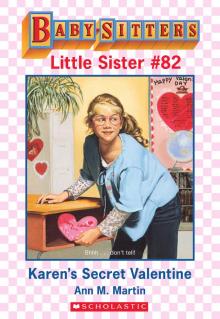 Karen's Secret Valentine
Karen's Secret Valentine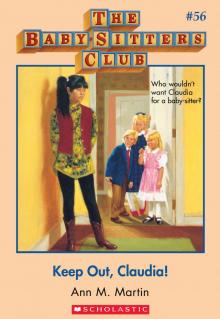 Keep Out, Claudia!
Keep Out, Claudia!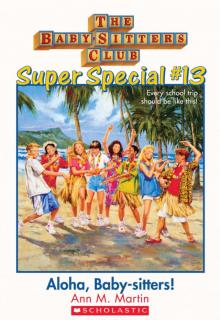 Aloha, Baby-Sitters!
Aloha, Baby-Sitters!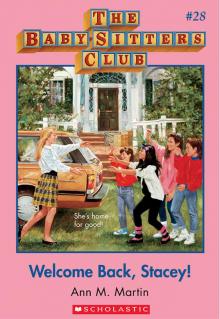 Welcome Back, Stacey
Welcome Back, Stacey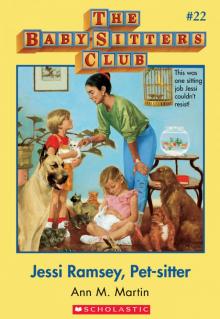 Jessi Ramsey, Pet-Sitter
Jessi Ramsey, Pet-Sitter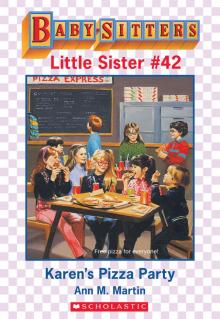 Karen's Pizza Party
Karen's Pizza Party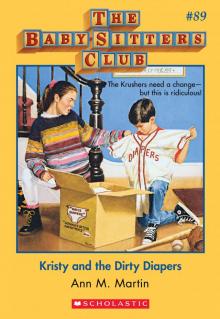 Kristy and the Dirty Diapers
Kristy and the Dirty Diapers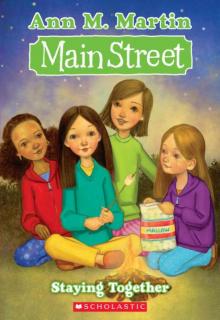 Staying Together
Staying Together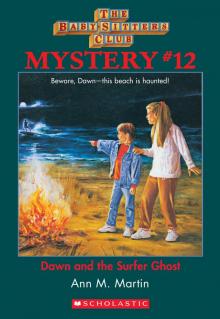 Dawn and the Surfer Ghost
Dawn and the Surfer Ghost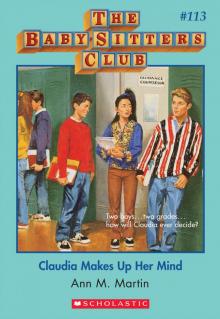 Claudia Makes Up Her Mind
Claudia Makes Up Her Mind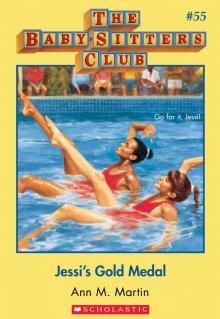 Jessi's Gold Medal
Jessi's Gold Medal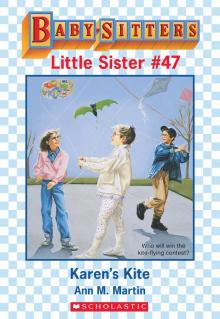 Karen's Kite
Karen's Kite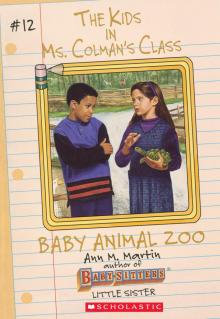 Baby Animal Zoo
Baby Animal Zoo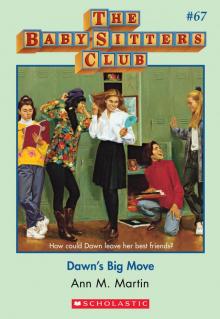 Dawn's Big Move
Dawn's Big Move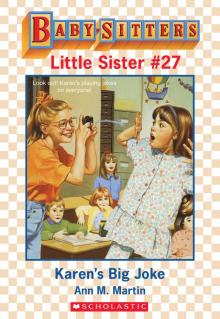 Karen's Big Joke
Karen's Big Joke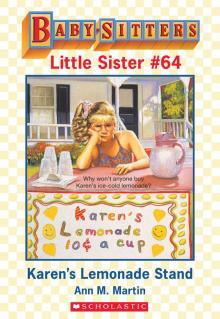 Karen's Lemonade Stand
Karen's Lemonade Stand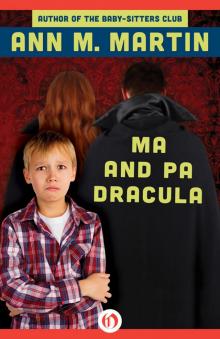 Ma and Pa Dracula
Ma and Pa Dracula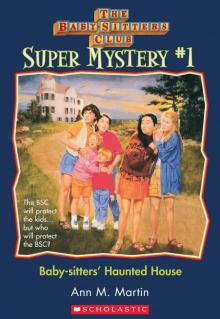 Baby-Sitters' Haunted House
Baby-Sitters' Haunted House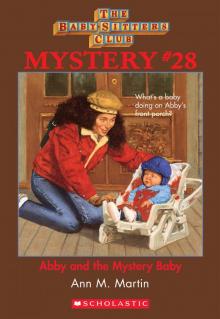 Abby and the Mystery Baby
Abby and the Mystery Baby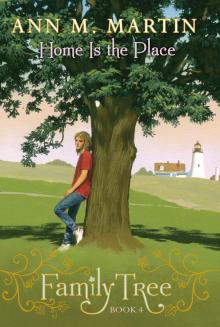 Home Is the Place
Home Is the Place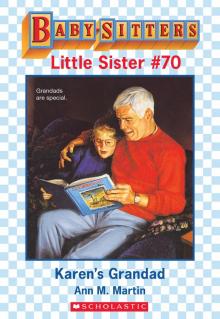 Karen's Grandad
Karen's Grandad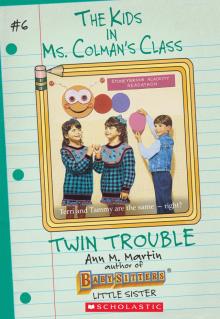 Twin Trouble
Twin Trouble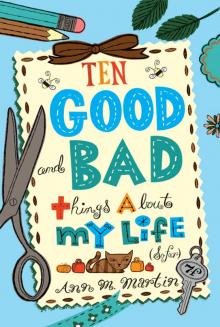 Ten Good and Bad Things About My Life (So Far)
Ten Good and Bad Things About My Life (So Far)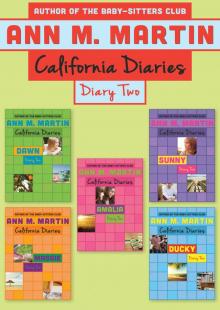 Diary Two
Diary Two Baby-Sitters Club 027
Baby-Sitters Club 027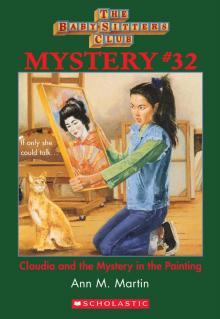 Claudia and the Mystery Painting
Claudia and the Mystery Painting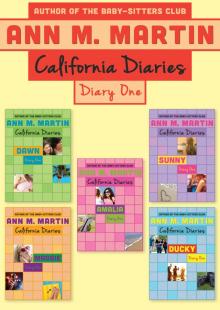 Diary One
Diary One Baby-Sitters Club 037
Baby-Sitters Club 037 Baby-Sitters Club 028
Baby-Sitters Club 028 Baby-Sitters Club 085
Baby-Sitters Club 085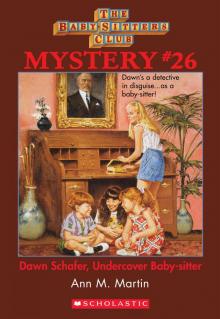 Dawn Schaffer Undercover Baby-Sitter
Dawn Schaffer Undercover Baby-Sitter Jessi's Babysitter
Jessi's Babysitter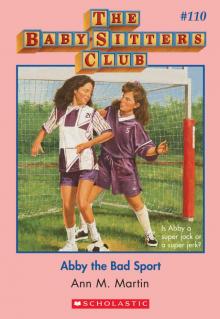 The Baby-Sitters Club #110: Abby the Bad Sport (Baby-Sitters Club, The)
The Baby-Sitters Club #110: Abby the Bad Sport (Baby-Sitters Club, The) Karen's Little Sister
Karen's Little Sister Baby-Sitters Club 058
Baby-Sitters Club 058 Claudia And The Genius On Elm St.
Claudia And The Genius On Elm St.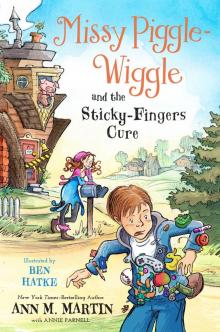 Missy Piggle-Wiggle and the Sticky-Fingers Cure
Missy Piggle-Wiggle and the Sticky-Fingers Cure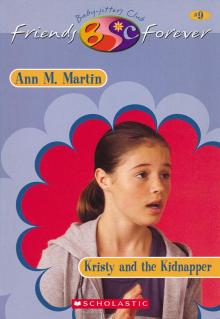 Kristy and Kidnapper
Kristy and Kidnapper Baby-Sitters Club 041
Baby-Sitters Club 041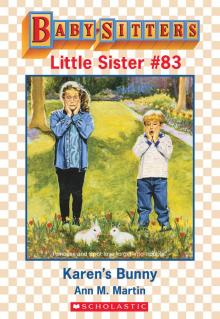 Karen's Bunny Trouble
Karen's Bunny Trouble Baby-Sitters Club 032
Baby-Sitters Club 032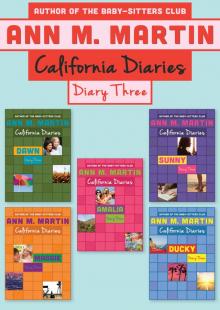 Diary Three
Diary Three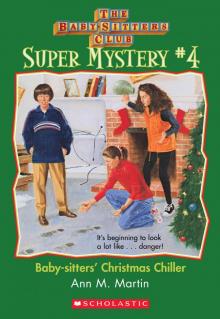 Christmas Chiller
Christmas Chiller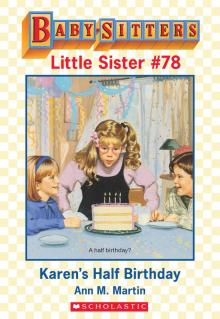 Karen's Half-Birthday
Karen's Half-Birthday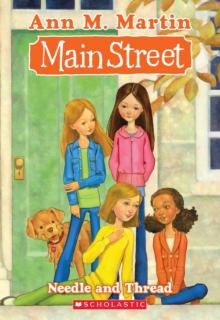 Needle and Thread
Needle and Thread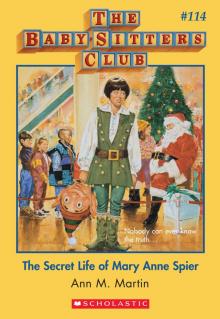 Secret Life of Mary Anne Spier
Secret Life of Mary Anne Spier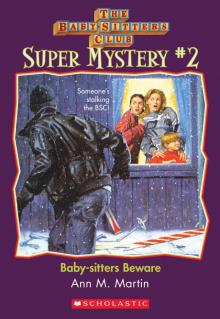 Baby-Sitters Beware
Baby-Sitters Beware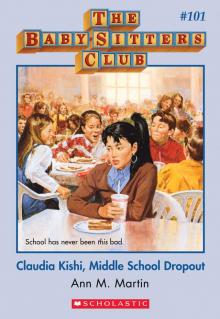 Claudia Kishi, Middle School Drop-Out
Claudia Kishi, Middle School Drop-Out Logan Likes Mary Anne !
Logan Likes Mary Anne ! Baby-Sitters Club 061
Baby-Sitters Club 061 Best Friends
Best Friends Baby-Sitters Club 031
Baby-Sitters Club 031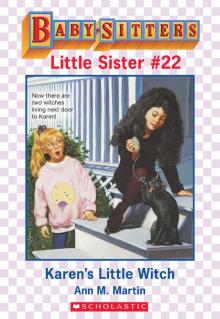 Karen's Little Witch
Karen's Little Witch Jessi Ramsey, Petsitter
Jessi Ramsey, Petsitter Baby-Sitters Club 123
Baby-Sitters Club 123 Baby-Sitters Club 059
Baby-Sitters Club 059 Baby-Sitters Club 033
Baby-Sitters Club 033 Baby-Sitters Club 060
Baby-Sitters Club 060 Baby-Sitters Club 094
Baby-Sitters Club 094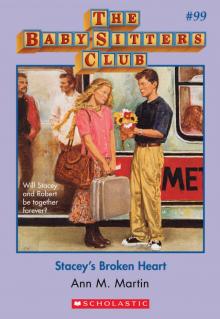 The Baby-Sitters Club #99: Stacey's Broken Heart
The Baby-Sitters Club #99: Stacey's Broken Heart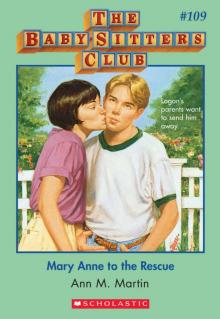 The Baby-Sitters Club #109: Mary Anne to the Rescue (Baby-Sitters Club, The)
The Baby-Sitters Club #109: Mary Anne to the Rescue (Baby-Sitters Club, The) Mystery At Claudia's House
Mystery At Claudia's House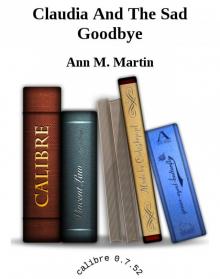 Claudia And The Sad Goodbye
Claudia And The Sad Goodbye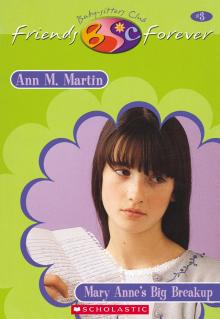 Mary Anne's Big Break-Up
Mary Anne's Big Break-Up Baby-Sitters Club 025
Baby-Sitters Club 025 Baby-Sitters Club 042
Baby-Sitters Club 042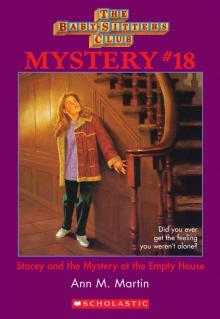 Stacey and the Mystery of the Empty House
Stacey and the Mystery of the Empty House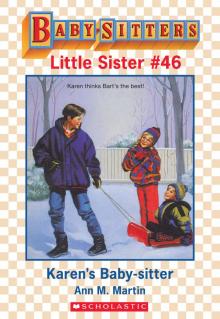 Karen's Baby-Sitter
Karen's Baby-Sitter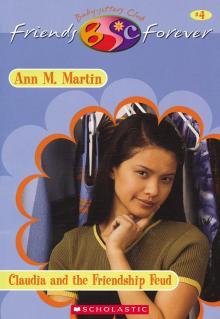 Claudia's Friendship Feud
Claudia's Friendship Feud Baby-Sitters Club 090
Baby-Sitters Club 090 Baby-Sitters Club 021
Baby-Sitters Club 021 Baby-Sitters Club 056
Baby-Sitters Club 056 Baby-Sitters Club 040
Baby-Sitters Club 040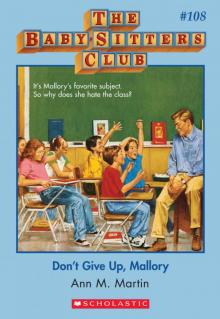 The Baby-Sitters Club #108: Don't Give Up, Mallory (Baby-Sitters Club, The)
The Baby-Sitters Club #108: Don't Give Up, Mallory (Baby-Sitters Club, The)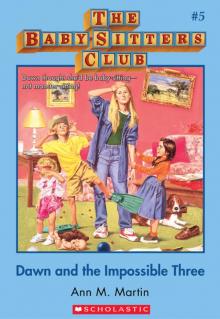 Dawn and the Impossible Three
Dawn and the Impossible Three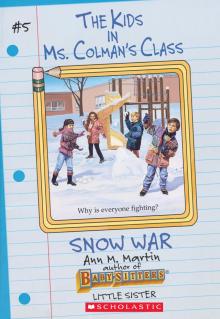 The Snow War
The Snow War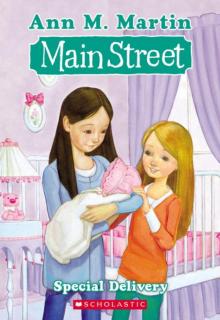 Special Delivery
Special Delivery Baby-Sitters Club 057
Baby-Sitters Club 057 Mary Anne And Too Many Babies
Mary Anne And Too Many Babies Baby-Sitters Club 030
Baby-Sitters Club 030